Executive Summary
Introduction
Founded in 2008, Airbnb is a San Francisco-based company in the hospitality industry. Although it has reported a lot of success in the global market, it has been unable to replicate the same in China. For example, out of the company’s 2 million global listings, only 2% of them are based in China. This percentage could be smaller (1.5%) because it is estimated that about 30,000 listings are associated with Chinese homeowners.
The situation is further worsened by the fact that Airbnb has barely made an impact in areas or regions outside first-tier cities. For example, in Harbin city, the company only has about 300 listings, even though it is bigger than the size of Los Angeles city. The inability of Airbnb to have a significant impact in China is further complicated by the fact that its competitors, such as Tujia and Mai, have a higher number of listings.
The purpose of this research is to evaluate the current strategy of peer-to-peer accommodation companies and help Airbnb to better develop its Chinese business. Three key research objectives guide the investigation. They are designed to identify factors influencing the company’s business performance in the Chinese market, to understand the nature of relationships that exist between factors affecting its consumer choices as well as the company’s performance, and to explore new ways of how customers in the Chinese market can better accept and sustain its operations in the country.
Literature Review
Although a sharing economy poses several benefits to its users, market sustainability problems linger. For example, the sharing economy poses many challenges when it comes to regulation, such as tax evasion problems, which could suffice when Airbnb users fail to pay tourist tax. Furthermore, problems regarding fairness could also emerge because it is difficult to safeguard the rights of customers on a platform that is poorly regulated.
Consequently, there are many uncertainties associated with the behavior of users who use the sharing economy platform and authorities who regulate the industry. Although Airbnb wants to increase its market share in the Chinese economy, it requires a business model (generally composed of networks, propositions, architectures, and financial values) that matches with the country’s economy and culture.
This is because the development model of China’s shared economy is very different from other countries’ commercial operating frameworks. After all, the Asian country has a strong traditional cultural background. Therefore, an industry that is interested in the Chinese market must first understand the traditional Chinese culture, especially in the hotel industry.
Methodology
This study has four variables, which are accommodation experience, security, platform user experience, and price. Collectively, they form the independent variables for the investigation. Consumer behavior research was also implemented as the model of market research. It refers to a combination of quantitative and qualitative aspects of analysis, relative to the various actions taken by consumers to acquire, use, and dispose of consumer goods, as well as the decision-making processes that determine these actions.
In addition to understanding how consumers get products and services, consumer behavior research was undertaken to understand how the participants used Airbnb. It was also used to comprehend their experiences about the same process. Information was sought from 573 respondents who were recruited and contacted online. The questionnaire was the main form of the data collection tool. It was structured and divided into two key segments that explored the demographic information relating to the research informants and their views on the research variables (accommodation experience, security, user experience, and price).
Data were analyzed, as descriptive information, using the Microsoft Excel method. This technique reviewed the overall structure of the statistics, which was intended to make the results of the questionnaire survey more straightforward and intuitive. The analysis included simple data calculation techniques such as percentages and averages. The information was presented graphically using pie charts and histograms.
Findings
Broadly, the findings highlighted in this study show that Airbnb’s Chinese business is at crossroads because the respondents generally held mixed reviews about its operations. For example, most of them were uncertain about specific aspects of their operations, such as security and hygiene. At the same time, there were concerns that the service provided a low-quality user experience. Additionally, there was a general low sense of awareness about its products among the respondents.
Alternatively, the evidence provided in this study shows that the company has a strong social value to the informants because it made them connect well with their environment and with other people. The informants also said that the firm has a strong price value because of its ability to generate additional income. This information means that Airbnb has an opportunity to redeem its business in the Chinese market because it could capitalize on the positive aspects of the findings to bolster its business strategies and minimize its weaknesses to support the same goal.
Critical Analysis and Discussion
The negative reviews of Airbnb generated by the respondents could be partly attributed to the failure of the California-based firm to understand the unique cultural dynamics of China and its effects on the business’s operations. Comparatively, the positive reviews provided by the respondents about Airbnb could be used to explain the company’s positive impact, such as the provision of additional revenues for homeowners and a strong social value it offers users who want to visit new places and know new people.
Conclusion
Since the lack of direct communication between hosts and guests emerged as one of the concerns affecting Airbnb’s operations in China, it is important to point out the need for the company to improve customer user experiences as a precursor to growth. To address the problem of a low sense of awareness of Airbnb in China, the company also needs to enhance its marketing campaign on the continent. Particularly, it needs to increase its visibility in the market because it appears that its competitors are doing a better job in this regard. Airbnb should also improve its platform experience because its users are concerned about its functionality.
Declaration of Originality
I hereby declare that this thesis has been composed by myself and has not been presented or accepted in any previous application for a degree. The work, of which this is a record, has been carried out by myself unless otherwise stated and where the work is mine, it reflects personal views and values. All quotations have been distinguished by quotation marks and all sources of information have been acknowledged using references, including those of the Internet. I agree that the University has the right to submit my work to the plagiarism detection sources for originality checks.
Introduction
Background
The sharing economy is not only a market development trend but also an important academic topic (Cherry 2018). Multiple definitions of the sharing economy exist. For example, the concept of a shared economy is defined as a platform where people use underutilized assets to promote efficiencies in their consumption (Frenken & Schore 2017). The sharing economy has emerged from this trend and can be defined as a socio-economic ecosystem that is premised on the sharing of assets by promoting cooperation on most aspects of social and economic development (Hamari, Sjöklint & Ukkonen 2016). Several companies associate their business models with this business framework and Airbnb is one of them.
Stemming from the growth of the sharing economy, Airbnb has made a name for itself as one of the fiercest rivals for traditional hotel businesses. Its threat in the market could largely be attributed to its capacity to provide customers with alternative accommodation options, different from the traditional hotel business model, where customers book a room and eat at a restaurant (Hofacker, Malthouse & Sultan 2016). Airbnb provides a different type of accommodation to customers because it accords them a “homely” experience (Airbnb Incorporated 2017). Consequently, the company operates as an online marketplace where prospective clients view listings and contact apartment or homeowners to book residences for short-term or long-term stays.
This business model allows property owners to lease out their houses for short-term or long-term stays. There are often different kinds of accommodation options offered on the platform, but the most common ones include apartments, cottages, and holiday homes (Airbnb Incorporated 2017). It is pertinent to point out that the company does not own any of these properties. Similarly, it does not arrange for tours.
Instead, its business model is agency-based where it takes a specific fee for every booking made on the platform (Airbnb Incorporated 2017). Currently, reports show that more than 5 million listings have been published on the platform (Airbnb Incorporated 2018a). Its market presence is also spread across more than 81,000 cities and 190 countries around the world (Airbnb Incorporated 2018a). Statistics also reveal that the company has facilitated more than 300 million check-ins since its inception (Airbnb Incorporated 2018a).
Since Airbnb is known for providing customers with a different experience from traditional hotels, its global rise in the industry has been nearly unstoppable. Indeed, as Hempel (2018) points out, from the time the company’s founders first hosted guests in their apartments, the company has been able to scale the heights of success that most technology companies have failed to reach. Hempel (2018) says that the name “Airbnb” has become a verb. Today, estimates show that the San Francisco-based organization is worth more than $24 billion and this figure is expected to rise in the future.
Statement of the Problem
Although Airbnb has realized a lot of success in the global market, it has been unable to replicate the same in China. For example, according to Hempel (2018), out of the company’s 2 million global listings, only 2% of them are based in China. Some literature suggests that this percentage could be smaller (1.5%) because it is estimated that about 30,000 listings are associated with Chinese homeowners (Hempel 2018).
The situation is further worsened by the fact that Airbnb has barely made an impact in areas or regions outside first-tier cities. For example, in Harbin city, the company only has about 300 listings, even though it is bigger than the size of Los Angeles city (Hempel 2018). The inability of Airbnb to have a significant impact in China is further complicated by the fact that its competitors, such as Tujia and Mai, have a higher number of listings. Indeed, Tujia has 420,000 listings, while Mai has about 300,000 similar listings (Hempel 2018).
The poor performance of Airbnb in China could be partly explained by the views of Custer (2018), which presupposes that the failure of Airbnb to make a meaningful impact on the Chinese market is cultural. In other words, he suggests that Airbnb has not learned to address the needs, preferences, and desires of Chinese users. In line with this discussion, Custer (2018) points out issues about trust, which is a big challenge impeding the success of sharing platforms in China because its residents seem to have a problem believing those who sell their products virtually.
Similarly, the Chinese experience several challenges using Airbnb’s email platform because they are often used to instant messaging sites where they get a response (immediately) when they inquire (Custer 2018). At the same time, the Airbnb platform makes it difficult to contact a homeowner directly because all communications are channeled through the platform. Therefore, there may be issues relating to trust or miscommunication because the company maintains the right to edit or scrutinize such communications before they reach their intended audience. This messaging platform is unlike Tujia where the phone numbers of available homeowners are provided and a customer can message them directly.
The challenges of Airbnb in China also align with the views of Custer (2018) who suggests that part of Airbnb’s weakness has been the low speed at which it chose to enter the Chinese market. Reports show that the company only recently decided to venture into the market, thereby giving its competitors (like Tujia) a significant head start that they have used to perfect their business (Custer 2018). The entrenchment of its competitors means that for every Chinese city that Airbnb is present in; there is stiff competition from existing market entrants. Furthermore, most of these competitors have deeply entrenched business networks. Similarly, they have cultivated a sense of trust among the local populations. Therefore, it could be difficult for customers to choose Airbnb over local businesses.
Since this paper focuses on Airbnb’s operations in China, it is also important to point out the unique peculiarities of the Asian economy as a problem affecting the company because there are many regulatory uncertainties, which may prevent the growth of the business in the populous country. Custer (2018) suggests that the reason why China has not tightened its regulations around the activities of the American-based Corporation is its minimal impact on the economy. Therefore, there are concerns regarding how Airbnb will operate in a country where the rules are still fuzzy.
Indeed, China poses new kinds of problems for the company, as was the case with eBay, which failed to gain traction in the communist nation because a little-known company (Alibaba) made it impossible for the widely successful global corporation to make significant gains in it (Custer 2018). Nonetheless, unlike eBay and Uber, which failed to gain a significant market share in China, Airbnb’s story cannot be termed as a failure, but rather a “setback” because industry players say it has the potential to grow if it redesigns its business strategies (Hempel 2018).
It is from this premise that this paper seeks to understand factors affecting consumer choices for Airbnb in China. The justification for conducting this study is hinged on the fact that only through understanding customer preferences and tastes about Airbnb can the company make significant changes to improve its success.
Justification for the Study
Based on the inability of Airbnb to make a significant impact on the Chinese market, observers have created the perception that the Chinese market is difficult to understand. Airbnb seems to recognize this fact because its Chinese business is one of its four core focuses, whereby the other three are its “homes” business, its activity-driven experiences, and prioritization of luxury rental properties for its high-end consumers (Airbnb Incorporated 2017; Custer 2018).
The findings of this study will be useful to companies that are struggling to make an impact in China. For example, new start-ups that want to tap into the potential opportunities that exist in the communist nation could learn from the Airbnb experience to better develop their business strategies, especially because it has a big population.
Airbnb recognizes the potential that exists in this market and this explains why it has chosen to focus on improving its Chinese business, particularly because it aims to target the high population of Millennials who are in China (Hempel 2018). The findings of this study will help to provide a deeper context and understanding of Airbnb’s vision, and how best to achieve it by investigating factors affecting consumers’ choices of Airbnb in the Chinese market. A statement of the research aim appears below.
Research Aim
To evaluate the current strategy of peer-to-peer accommodation companies and help to improve Airbnb’s performance in the Chinese sharing economy market.
Research Objectives
- To identify factors influencing Airbnb’s business performance in the Chinese Market.
- To understand the nature of relationships that exist between factors affecting consumer choices of Airbnb’s and the company’s performance.
- To explore new ways of how customers in the Chinese market can better accept and sustain Airbnb’s operations in the country.
Literature Review
Understanding the Shared Economy
The sharing economy is not only a market development trend but also an important academic topic (Cherry 2018). Multiple definitions of the sharing economy exist. First, the concept of a shared economy is defined as “customers trusting each other to obtain available personal assets, which are underutilized and also can create the new business model through the sharing economy to get benefits” (Frenken & Schore 2017, p. 5).
The sharing economy can also be defined as a socio-economic ecosystem that is premised on the sharing of human, material, and intelligence resources that often include cooperation on most aspects of social and economic life (Hamari, Sjöklint & Ukkonen 2016). Typically, the process would include different people and organizations to co-create, produce, distribute, trade, and share consumer goods and services (Frenken & Schore 2017). Although there are many existing definitions of a sharing economy, there are a few contentious definitions of the same concept. For instance, Eckhardt and Bardhi (2015) say the sharing economy cannot be seen as a platform where people use their assets in exchange for consumers’ money.
Although the concept of a shared economy only became popular in recent years, it is not a new concept in the market. Sharing refers to a universal model of economic production, which is people-oriented. It is derived from the sharing of traditional economic and material goods, which is a product of processes involving the co-creation of goods and services by all users (Benkler 2004). Compared with the sharing principle, virtue is not a sharing economy.
The sharing economy is a model of business operation; a way for companies to obtain economic benefits and a term that allows participants to trust marketing (Gobble 2017). The most obvious difference between the traditional concept of sharing and the new “sharing” referred to in business would be that the latter could be used as an economic model.
There are four major “sharing economy” activities, which people use in the above-mentioned economic model. They include the cyclical use of goods, growth in the sustainable use of assets, exchange of services, and sharing of productive assets (Puschmann & Alt 2016). The goal is often to make new friends, experience new technologies, innovate, and live a more environmentally friendly lifestyle (Schor 2014).
Consumer Acceptability Problems with the Sharing Economy
The business of sharing economy is comprised of many tenets, including (but not limited to) enterprises, customers, trust mechanisms, supervision departments, and internet technologies (Matofska 2018). Each tenet is indispensable. However, vendors and consumers are some of the most critical parts of the chain because if any one of them fails, the sharing process will be incomplete. New business models are composed of service providers (drivers, hosts, and valet), service enablers (such as Uber, Airbnb, and luxe), and customers (Wirtz & Tang 2016). The most important part of the chain is the service enabler who receives feedback between service providers and customers. He or she also reflects on the customers’ needs and adjusts business processes to reflect the same (Kumar, Lahiri & Dogan 2018).
Since the new sharing economy is mainly short-term in nature, “service” is at its core. Consequently, most service providers strive to improve the quality of their businesses to attract more customers (Kumar, Lahiri & Dogan 2018). Consequently, customers gain from such developments through reduced waste and resource use, increased access to affordable goods, and improved collaboration.
However, there are also some concerns associated with the sharing economy. For instance, the sharing economy does not meet certain social values of equality. Indeed, in a shared economy, social equality is difficult to achieve, and not everyone can participate in it (Ying 2016). For example, people’s backgrounds and requirements are a deterrent to the realization of equitable outcomes. Additionally, to take part in a shared economy, people need to fulfill certain requirements imposed by the service providers, such as making payments in certain currencies.
However, the requirements may be difficult for some to fulfill, thus it would be difficult for them to accept the shared economy. Inequality is also likely to be propagated in a shared economy because “people with higher-quality assets are more likely to benefit from it better than those who do not own any capital. Such structures increase the risk of creating a hierarchical society that many people detest.
Market Sustainability Problems of the Sharing Economy
Although a sharing economy poses several benefits to its users, market sustainability problems linger. For example, the sharing economy poses many challenges when it comes to regulation. Indeed, there can be tax evasion problems such as those associated with the failure to pay tourist tax. Furthermore, problems regarding fairness could also emerge.
Relative to this assertion, the former US Secretary of Labor, Robert Reich, criticized the concept of the sharing economy by saying that the “new culture of on-demand work is a reversion to the nineteenth century when workers had no power and no legal rights, took all the risks and worked” (Yeomans 2018, p. 5). Additionally, supervision is another important aspect of the sharing economy platform that undermines its sustainability (Nestor & Infranca 2016).
In terms of legal issues, the sharing economy emphasizes the need for supervision because stakeholders are required to maintain a high quality of operations, maintain consumer protection standards, a fair market, and so on (Hawksworth & Vaughan 2014). The development of this sharing economy has driven the government and local regulatory authorities to make suitable changes that reflect this need because such industries are currently in the “grey area” of the legal world. As a result, “this is not only a risk for consumers but also a hindrance to the development and innovation of new industries” (Orsi 2013, p. 17).
Some scholars who have published articles discussing the sharing economy think that the issues that arise from the sharing economy must be viewed from two sides- both positive and negative. On one side, opponents believe that such sharing will lead to crime, unfair market competition, and privacy violations, but proponents believe that smart supervision can solve these problems and bring more market potential (Frenken et al. 2015). Although there are still many problems associated with sustainability, the sharing economy could help businesses and societies to become sustainable.
The Current Development Strategy of Airbnb
Founded in 2008, Airbnb is a San Francisco-based company in the hospitality industry. The firm allows its customers to lease or rent short-term housing and receives service and transaction fees with every booking made. According to recent statistics, Airbnb’s rooms have received over 300 million customers in 191 countries and 81,000 cities worldwide (Airbnb Incorporated 2018a). Airbnb is a typical example of a business that thrives on the concept of a shared economy. Specifically, it is based on “peer-to-peer economics” because sharing is free behavior. Airbnb combines the sharing aspect with the economy as they found out that people are willing to pay a fee online to get an ideal private room when they travel or live outside their homes (Liang, Choi & Joppe 2018).
In contrast to traditional hotels, Airbnb has more rooms (rooms leased for rent by people) which makes it more diverse for its potential customers to select. The sharing concept is where people lease their homes for other customers to rent. This concept has created markets that rent assets to generate income. Before this concept, renting assets were not considered as a revenue-generating method. Back in the early days of Airbnb’s establishment, the founder was told that renting personal houses to strangers was a crazy, unbelievable, and impracticable idea (Turen 2017). However, Airbnb was different from other online short-term companies because it can make profits.
In the very first week of the business, the weir rental idea earned $1000. The surprising profit-generating method represents the sharing economy and successfully persuaded people to believe that the sharing concept is the best way to earn money. Even though Chesky, one of the founders of Airbnb, never considered the company as one that tapped into the sharing economy, he considered it as a tool to solve their problems (Geron 2013). The company’s strategy is explained below.
Airbnb employs many strategies to guarantee consumer satisfaction and maximize profit. The Airbnb business has continuously improved its services and introducing new products, as the needs of its customers are continuously changing. The strategy of Airbnb will be divided into three aspects. They include what the company does to ensure consumer satisfaction, its culture, tourism, and the limitations to its strategy. These three aspects of the analysis are further explored below.
What Airbnb Does To Ensure Customer Satisfaction
Airbnb recently diversified its services by launching different types of houses, such as apartments, dormitories for young people, whole houses, and shared accommodation where visitors and the property owners live in the same house (Lutz & Newlands 2018). After investigation, it was confirmed that customers who use Airbnb not only pay attention to cheap prices but also interesting local experiences on the Airbnb platform (Liang, Choi & Joppe 2018).
Since Airbnb offers a variety of accommodation options, consumers can enjoy different travel experiences. The company also recently launched a “super-host” badge for owners, which can guide customers in evaluating the rooms, owners, and service experiences (Zaleski & Chen 2016). This approach not only improves the quality of hosting services but also makes it faster for the other customers to better understand and choose their right accommodation option (Liang et al. 2017).
Airbnb’s managers are also aware of its shortcomings after discussions and criticism from various sectors of society. For example, there have been concerns about privacy on the platform. In response, the company introduced user authentication steps that require a user to provide real photos, ID’s, and social media accounts to increase the consumer’s safety index (Guttentag & Smith 2017). Such strategies characterize the approaches undertaken by the organization to bolster its overall strategy. Its culture is explained below.
Company Culture and Tourism
Airbnb’s business brand, culture, revenue, and tourism offerings have exerted an enormous amount of pressure on the traditional hotel business. From the Airbnb business brand’s point of view, the company’s branding philosophy is to allow guests to live in homelike surroundings, understand local customs and culture, and give visitors a special feeling and a sense of belonging, which contrasts the experience they would get from hotels (Liu & Mattila 2017). According to Aaker’s five dimensions model of brand personality, some users will associate one of its five tenets (excitement, daring, spirited, imaginative, and being up-to-date) with the Airbnb brand (Lee & Kim 2018).
Mark Levy, a manager responsible for managing Airbnb employees, said that the founder of Airbnb aligned the company’s corporate culture and values with the sharing behavior when he founded it (Bajer 2016). The most direct and objective reflection of this principle on the business is enshrined in the company’s business income data. Airbnb is an inestimable competitor and about 8% to 10% of the hotel’s yield is influenced by its Austin operations (Zervas, Proserpio & Byers 2017).
The hotel room’s revenue will decrease with an increase in its number of rooms. For every 10% Airbnb increase, hotel room revenue will drop by 0.37% (Zervas, Proserpio & Byers 2017). In 2015, the Airbnb business earned over $451 million in revenue, which accounted for 5% of the total hotel industry’s revenue, and it is set to increase exponentially in the future (HVS 2015).
From a tourism perspective, a key aspect that Airbnb needs to develop is taking travelers to places outside local traditional tourism attractions by adding a variety of residential homes around the world (O’ Regan & Choe 2017). The development of the hotel industry is inseparable from the development of the tourism industry. Research demonstrates that Airbnb services offered near the Lombok attraction found out that the growth of the company’s business and the development of tourist attractions complement each other (Ioannides, Röslmaier & Van Der Zee 2018).
It was also established that the frequency of Airbnb listing activities far away from scenic areas was relatively weak (Ioannides, Röslmaier & Van Der Zee 2018). It was also evident that the introduction of Airbnb severely hindered the development of hotels in locations that are economically tourism-reliant because their guests (including those who travel on a private basis) are more likely to choose Airbnb housing over traditional hotel business accommodation options (Weed 2015).
Limitations to Airbnb’s Strategy
Due to Airbnb’s popularity and success, the number of people who lease their homes on the Airbnb website to strangers is set to increase. However, these online sharing platforms are limited by acceptance problems from the public, and more importantly, from risks and legal issues in various countries. In terms of its acceptability, the Pew Research Centre published an article called The New Digital Economy and it mentioned that 11% of Americans had used online short-term rental services like Airbnb and Home Away in 2016 (Smith 2016). Some users think these services are good choices for travelers and it brings additional income for homeowners, but approximately one-in-five people regard Airbnb as risky to use because they think it is only suitable for “adventurous” guests (Smith 2016).
Furthermore, the survey showed that due to the lack of strict laws and regulations in some countries, some Airbnb users believe that short-term vacation rental companies like Airbnb and Home Away will operate for a long time to live because they bring about additional economic benefits to homeowners. However, they increase the risks for residents and change the relationship between neighbors at the same time (Jordan & Moore 2018). For residents that live in local areas, the sharing economy will make a great impact on their life (Jordan & Moore 2018).
In terms of legal issues, Airbnb is also breaching laws in certain cities in the US. For example, “in New York, owners or tenants cannot legally rent their apartments out for short periods (less than 30 days) unless they are also living in the property” (Coldwell 2018, p. 13). Furthermore, there are also tax issues because “in many cities in the US, people that rent out holiday accommodation are expected to pay a hotel or tourist tax” (Coldwell 2018, p. 14). Although aspects of operations under the shared economy model, such as Airbnb, have been criticized, it cannot be denied that there are still three main reasons why people would choose this platform: it is an innovative service model, provides job opportunities, and allows people to make more money than regular jobs (Kumar 2015).
The Development of the Chinese Sharing Economy Market
The development of a shared economy can solve urban problems, such as insufficient resources, employment, and sustainable development. It brings great advantages and positive effects in cities and countries. A sharing economy is a sustainable form of consumption under certain conditions, and it can also be a solution to decentralization, equity, and sustainable economics (Martin 2016). Therefore, developing a shared economy may provide new ways for sustainable development (Heinrichs 2013). Many literature and case studies about Airbnb have also confirmed that sustainable development is beneficial to users as the sharing economy continues to change and improve (Daunorienė et al. 2015; Minter 2015).
The first is that it solves the problem of insufficient resources. In many definitions of the concept of the sharing economy, it can be seen that the keywords are the sharing of unused or underutilized assets, which intangibly saves individual assets and social resources. Sharing can promote the development of communities, save society resources, and create a certain degree of synergy among people who live in them (Belk 2007). For example, Uber’s service philosophy is to provide efficient travel, reduce vehicle exhaust emissions, and save transportation costs (Orsi 2013).
The second benefit of Airbnb is to solve employment problems. Relative to this assertion, the development of the sharing economy made people consider the difference between formal employees and part-time workers. In the past, formal employees were at the core of an organization’s human resource plan. However, now, the activities of the sharing economy consist of a large number of “part-time” personnel (Mair & Reischauer 2017). Some studies have shown that the sharing economy can solve the problem of unemployment among urban residents to a certain extent, especially in the tourism industry (Mair & Reischauer 2017). Therefore, the government should formulate appropriate policies to control the positive development of the sharing economy (Fang, Ye & Law 2016).
The Market of Chinese Sharing Economy
As we know, China is a developing country in stage 3 of the demographic transition model. It is also the most populous country and it has a high potential for development. The Asian giant has also become the largest consumer of international tourism and the sector is an important aspect of its economy, with its rapidly growing market influence (Amaro, Andreu & Huang 2018). Currently, the major industries in the sharing economy that are developing in China are transportation and rental businesses.
The hospitality and rental business in China is fierce, and Airbnb has the potential to do well in the country. According to Airbnb’s statistics, the company already has 5.3 million Chinese tourists and 80,000 Chinese listings (Airbnb 2017). However, China’s short-term rental company Xiaozhu has 100,000 listed projects, which makes them Airbnb’s largest competitor (Amaro, Andreu & Huang 2018). The Xiaozhu website launched in August 2012 and it currently provides 80,000 housing options in 250 locations in China (Amaro, Andreu & Huang 2018).
Xiaozhu’s business income rose rapidly due to an increased number of housing options and locations, which represents the rapid development of China’s sharing economy. In 2015, another leasing company, Tujia, made approximately US$ 1 billion in the same business (Wu 2017). Therefore, both Xiaozhu and Tujia are Airbnb’s biggest competitors in China. The leasing industry is booming as well and everyone would like to ‘get a piece of the pie’ (Wu, Ma & Xie 2017).
Venture capital is the operation mode for most companies in the Chinese sharing economy (Cheng et al. 2016). This business model is easier to replicate because companies as opposed to individuals operate it. It is also easy to understand because most of the profits from rented products belong to the holder of capital. For example, the sharing concept in China can be understood as if the staff of the Tujia Company owns the properties listed (Marquis & Yang 2014). Furthermore, some scholars who have analyzed factors affecting the choice of Chinese consumers found out that there are many uncertainties in the behavior of their scheduled sharing of rooms, such as curiosity, room facilities and services, and experienced travel reviews on the platform. Furthermore, some researchers mentioned that most Chinese users would not be impacted by a property owner’s response rate when they book a short-term room (Wu, Ma & Xie 2017; Wu 2017).
Airbnb and the Chinese Sharing Economy
Although Airbnb wants to enter the Chinese economy, it requires a business model that matches the country’s economy. The business model (generally composed of networks, propositions, architectures, and financial values) is crucial to the company’s operations and development (Gao & Zhang 2016). The development model of China’s shared economy is very different from other countries’ commercial operating models because China is a country with a strong traditional cultural background. An industry that is interested in the Chinese market must first understand the traditional Chinese culture, especially the hotel industry (Chen 2018).
Airbnb’s sharing model contradicts the traditional Chinese culture based on the relationships between hosts and guests in the Chinese culture (Discover the Authentic 2018). For example, the Chinese culture suggests that the host is “obliged to keep their guests fully occupied” by showing guests to touristy sites, treating them to meals, and accompanying them at most times (Discover the Authentic 2018). In this regard, culture can influence the rules and operating systems of a business operating within the sharing economy. It can also explain the different organizational structures of the sharing economy and the practices of diversified businesses (Mair & Reischauer 2017).
Since Airbnb does not subscribe to traditional rules, it may not be successful in China. However, according to official statistics, 3.5 million people in China are registered as Airbnb users in 2015 (Mair & Reischauer 2017). However, these results do not extensively represent Chinese users’ acceptance level of the business. This is why most of the registered population are users who are familiar with Western culture (mostly non-Chinese citizens) (Mair & Reischauer 2017). Therefore, Airbnb would need to make changes, to fit in the Chinese sharing economy.
Methodology
Research Methods
This section describes the specific data collection and analysis methods used to complete the investigation. Specifically, the first section of this chapter introduces the basic analysis model of the research, which is used to study and investigate factors that influence Airbnb’s acceptance and sustainability in the minds of consumers.
The next subsection explains the data collection methods, while in the third subsection, the specific research methods applied to this study are presented, along with the design of the questionnaire for this study (see the appendix for the specific questionnaire). The final section of this paper proposes the corresponding research hypotheses based on the dimensions of the analytical model and the specific research problems explored. Meanwhile, the specific analytical techniques and various statistical methods for the research hypothesis are detailed below.
The Model
Based on the literature review findings highlighted in this study, factors, which affect Airbnb’s current acceptance and continued use (by Chinese consumers) are linked to the following four categories: accommodation experience, security, user experience, and price. These elements of discussion were used to develop the model structure, which is outlined in figure 3.1 below.

As shown above, there are four variables in the model of this study, which are accommodation experience, security, user experience, and price. These attributes will be the independent variables for the investigation. Stated differently, they will be the elements affecting Airbnb’s acceptance and sustainability in the Chinese market. Comparatively, the term performance was the dependent variable in the model, which represented Airbnb’s performance in the Chinese market. In the subsequent section of this analysis, an explanation will be provided detailing how specific data representing these variables were obtained. The information was used to conduct the relevant analysis to achieve the research aim in the end.
The Data Collection
Typically, research information can be divided into primary and secondary data. Primary data also refer to raw data, which means it is the content obtained directly through personal interviews, inquiries, questionnaires, and measurements. Comparatively, secondary data refers to data that is not collected by ongoing investigations, such as interviews and questionnaires, but from other researchers who have done the same. This information is often public and easy to obtain (Guise, et al. 2010).
All variables in this research model are focused on understanding the consumers’ feelings and personal opinions. That means that all the relevant data required to analyze these variables are based on an individual and subjective. For example, the term “accommodation experience” refers to the living experience of a consumer using the Airbnb platform. The term “security” refers to a client’s perception of feeling safe when staying in a tourist destination chosen by Airbnb. Additionally, references made to attitudinal issues regarding Airbnb are linked to Chinese consumers’ attitudes towards the use of Airbnb.
This is a completely personal choice. In other words, these data will be based entirely on personal experiences and opinions. Although some references can be obtained from other related or similar research reports, it will be more reliable if they are obtained through primary information (Granello & Wheaton 2004). Therefore, for all the variables that will be investigated, the researcher will collect relevant primary data for subsequent analysis.
Here, it is also important to emphasize that the term “performance” represents Airbnb’s business performance in the Chinese market. This metric is usually represented by the company’s financial performance. Since this is a comprehensive reflection of the company’s performance, it will include the extent of its acceptance by the market and the prospects for development in the industry. The company itself usually discloses these financial indicators in their relevant annual reports. According to Unerman (2000), the annual report is the most concentrated medium for company disclosure. Based on its credibility, it is also regarded as the most important document for a company. Moreover, the annual report is an open document, so researchers are easily accessible.
The financial analysis will use different indicators such as net profit, Return on Assets (ROA), and Return on Earnings (ROE) to represent Airbnb’s performance in the Chinese market. The data source of financial indicators in this study is secondary, which is inconsistent with the data sources of the other four variables investigated. Moreover, for the other four sources, few secondary data can be collected and used for the analysis.
Therefore, to maintain the consistency of the data sources of this study and reduce the research limitations caused by different data collection techniques, this researcher used primary data to represent Airbnb’s performance in the Chinese market. That is, Chinese consumers’ willingness and attitudes to use Airbnb to book short-term travel accommodations.
Research Design
Once again, through the literature review in section 2, it can be understood that although the context of this research is on the sharing economy, with the new consumption model of internet platform short-term rental model represented by Airbnb, the essence of this study is still a typical consumer behavior study. Consumer behavior research is the most common and often implemented study in market research. It refers to a quantitative and qualitative investigation of the various actions taken by consumers to acquire, use, and dispose of consumer goods, as well as the decision-making process that determines these actions (Cummins, et al. 2014).
In addition to understanding how consumers get products and services, consumer behavior research also strives to understand how people consume and dispose of products after they are used up. Therefore, it is the basis of marketing decision-making and is inseparable from the marketing activities of the enterprise market. It can be said that it is of great significance to research on consumer behavior, especially regarding the improvement of the level of marketing decision-making and enhancement of the effectiveness of marketing strategies (Charles et al. 2016).
Regarding the research methods of consumer behavior, commonly used techniques include observation, interview, and questionnaire methods. The observation method is meant to understand the behaviors, actions, and expressions of consumers purposefully and systematically under normal conditions and analyze the internal causes to study the pattern of consumer psychology (Cummins, et al. 2014). The interview method is a way to understand the motivation, attitude, personality, and values of the respondents through conversations between the interviewer and the interviewee.
Finally, the questionnaire survey includes a set of questions that are specifically designed based on the research objectives and questions, along with an instruction for using the questionnaire, which includes the conditions, guidelines, and rules for the questionnaire answering process. After the subjects have answered the questionnaires, the raw data are collected, and then the corresponding conclusions are drawn by analyzing the results of the questionnaire (Kothari 2004).
The choice of specific research methods should be based on the objectives of the study and the corresponding analytical methods. The type of analysis methods available can be divided into qualitative and quantitative analyses. Qualitative analyses refer to the review and research of the attributes of certain facts through qualitative reasoning, philosophical thinking, and historical verification. These attributes are mainly used to study the social structure and function of communication, social control of communication, and the interrelationship between communication and social development (Miles, Huberman & Saldaña 2014).
It can be seen that this analytical method usually does not have professional statistical significance and does not require the application of statistical software. Therefore, research methods such as case studies are more suitable for qualitative analysis (Malina, Nørreklit & Selto 2011).
On the other hand, quantitative analysis refers to a review of the quantitative relationship of the components contained in the research object, or the quantitative analysis and comparison of certain properties, characteristics, and mutual relations of several research objects. The results of quantitative analysis are often described in terms of “quantity” and usually require the use of specialized mathematical tools and models for analysis. Therefore, the research method such as a questionnaire survey is more suitable for quantitative analysis (Malina, Nørreklit & Selto 2011).
The purpose of this research is to evaluate the current strategy of peer-to-peer accommodation companies and help Airbnb to develop better under the Chinese sharing economy market. In other words, the study aims to review what factors affect consumers’ choices of Airbnb in the Chinese market, and what kind of relationships exist between these factors and Airbnb’s performance. This study needs some data processing with scientifically based methods in the process of analysis. As a result, the questionnaire survey is the main data collection method of this study.
Questionnaire
The method of collecting data is critical to the overall analysis of this study because it is the basis for the collection of truthful data and thus in turn a reliable analytical conclusion and research process (Guise et al. 2010). In this study, as explained earlier, the research method of the questionnaire survey is going to be used as the main data collection method. A questionnaire survey is a widely used quantitative research method, and its most obvious advantage is that it can save a lot of time, money, and labor.
At the same time, the results of the questionnaire survey are relatively easy to be statistically processed and to be quantified, which is more suitable for the follow-up analysis in this study. The questionnaire survey is also applicable to large-scale surveys, especially when respondents are widely dispersed. This advantage supersedes those of other research methods, such as face-to-face interviews.
In today’s extremely developed internet society, questionnaires can be obtained from survey data faster and more efficiently, as this method does not require dedicated personnel to operate and perform every minute, and is not affected by geographical restrictions (Lopez-Fernandez & Molina-Azorin 2011). Moreover, it is important to note that since the scope of this study has been limited to the performance, acceptance, and sustainability of Airbnb in the Chinese market at the very beginning, this means that the sample that needs to be investigated is Chinese consumers who are in China. In other words, sending a paper questionnaire and asking Chinese consumers to answer is a less practical method.
Therefore, instead of distributing paper questionnaires or combining online and offline distribution methods, this study decides to use only the method of distributing questionnaires through the Internet to obtain relevant data. Specifically, the researcher chose to place the questionnaire on some large Chinese social online platforms (Douban and Sina Weibo) and then collected the data after some time.
Regarding the structure of the data collection instrument, the questionnaire survey was designed to collect relevant data to perform subsequent analysis to complete the study. In other words, the questionnaire was designed according to the model of the study. In this research, five variables needed to be studied. Consequently, the structure of the questionnaire was divided into six parts because there were five independent variables, and one dependent variable:
The first part investigated the basic information of the respondents, such as the characteristics of the individual, including gender, age, how familiar they were with Airbnb, whether they have used the platform before, when was their last visit. The goal of collecting this information was to have a preliminary and general understanding of Airbnb’s popularity in the current Chinese market.
The second part of the questionnaire was designed to measure the consumers’ experiences of staying in the short-term travel accommodation platform. The third part of the questionnaire was designed to measure the extent to which consumers have a sense of security about the short-term travel accommodation chosen by Airbnb. The fourth part of the questionnaire was designed to measure their experiences of operating and using the Airbnb platform.
The fifth part of the questionnaire was designed to measure the consumers’ experience of operating and using the Airbnb platform, while the sixth part was designed to measure their points of view regarding the prices of the short-term travel accommodation options chosen by Airbnb. In addition to the first part of the questionnaire, the scoring system was used to quantify the results of the study for easy analysis. In the analytical scale, “agree” represented 3 points, “neutral” represented 2 points, “no Idea” represented 1 point, and “disagree” was marked as 0 points.
Research Hypothesis
Summarising the main points of the previous sections, the research goal of this study was to evaluate current peer-to-peer accommodation company strategies to help Airbnb better develop its Chinese operations. This means that the study investigated factors affecting the consumers’ choices of Airbnb in the Chinese market. The data needed for this study to conduct the research was primary data, which was collected using a questionnaire survey.
The analysis model of this study contained five variables: accommodation experience, security, user experience, accommodation price, and Airbnb’s performance in the Chinese market (attitude of Chinese consumers in using Airbnb). The last variable was the dependent variable of the research model, while the first four variables are independent variables that form the four dimensions of this model. Based on the above analysis, along with the research problems proposed in Section 2, the specific research hypothesis of this study is as follows.
- RQ 1: What are the current influencing factors affecting Airbnb’s business performance in the Chinese Market?
This is an opening research question in this study and a research entry point for this study. Its purpose was to determine factors affecting Airbnb’s performance and its subsequent development in the current Chinese market. More specifically, this research question was designed to find out whether the four independent variables in the above research model can affect Airbnb’s performance or its consumers’ willingness to choose them, or determine whether there are certain relationships between them? Therefore, the following relevant hypotheses are proposed:
- Hypothesis 1: The accommodation experience significantly affects the attitudes of Chinese consumers’ towards Airbnb and thus influences the performance of the company in the Chinese market.
- Hypothesis 2: Perceptions of security significantly affect the attitudes of Chinese consumers’ towards Airbnb and thus influences its performance in the Chinese market.
- Hypothesis 3: The platform users experience significantly affects the attitudes of Chinese consumers’ towards Airbnb and its performance in the Chinese market.
- Hypothesis 4: The accommodation price significantly affects the attitudes of Chinese consumers’ towards Airbnb, thereby influencing the performance of the company in the market.
- RQ 2: What kind of relationship do these influencing factors have with Airbnb’s performance in the Chinese market?
This is a further research question compared to the first research one. Its purpose is to find out what kind of relationship exists between these independent variables and the dependent one. For example, consumers use Airbnb more frequently when they find that the accommodation experience for short-term travel booked through Airbnb is better. Through relevant research and the above literature review, in the acceptance and use of consumers, many scholars believe that the consumer experience will affect the willingness of individuals’ choices of use (Constantinide, Lorenzo‐Romero & Gómez 2010). Similar situations exist in the remaining three independent variables as well. For instance, if consumers are more secure about short-term travel and accommodation options, the likelihood that they will choose this accommodation option again is high (Noone & Mcguire 2016). As a result, relevant research hypotheses are as follows:
- Hypothesis 5: The accommodation experience has a positive and close relationship with the Chinese consumers’ attitude towards Airbnb and thus the performance of Airbnb in the Chinese market.
- Hypothesis 6: The feeling of security has a positive and close relationship with the Chinese consumers’ use attitude towards Airbnb and thus the performance of Airbnb in the Chinese market.
- Hypothesis 7: The platform use experience has a positive and close relationship with the Chinese consumers’ use attitude towards Airbnb and thus the performance of Airbnb in the Chinese market.
- Hypothesis 8: The accommodation price has a positive and close relationship with the Chinese consumers’ use attitude towards Airbnb and thus the performance of Airbnb in the Chinese market.
- RQ 3: According to the above analysis results, how can Airbnb be better accepted and sustained by customers in the Chinese sharing economy market?
This is a research problem that needs to be solved based on the results of data analysis and the relevant conclusions drawn from it. In other words, the answer to this research question is obtained from research problem 1, research problem 2, and the validation results of their related research hypotheses, individual own research hypothesis is not needed.
Data Processing
After the questionnaire is uploaded for a certain period, the answering process will be closed, and valid raw data will be collected and organized. After this, the study will use statistical Excel software with scientific and statistical methods to analyze the relationship between the variables proposed in the research model and to test the research hypotheses and theoretical models. A descriptive statistical analysis was used. It describes the overall structure of the statistics, which is intended to make the results of the questionnaire survey more straightforward and intuitive. This analysis is mainly going to be conducted by simple data calculation techniques such as percentages and averages, and corresponding charts include pie charts and histograms.
Findings
Demographic Findings
Voluntary Consent
In the first part of the study, the researcher sought the respondent’s consent to participate in the investigation. The findings are highlighted in figure 4.1 below.
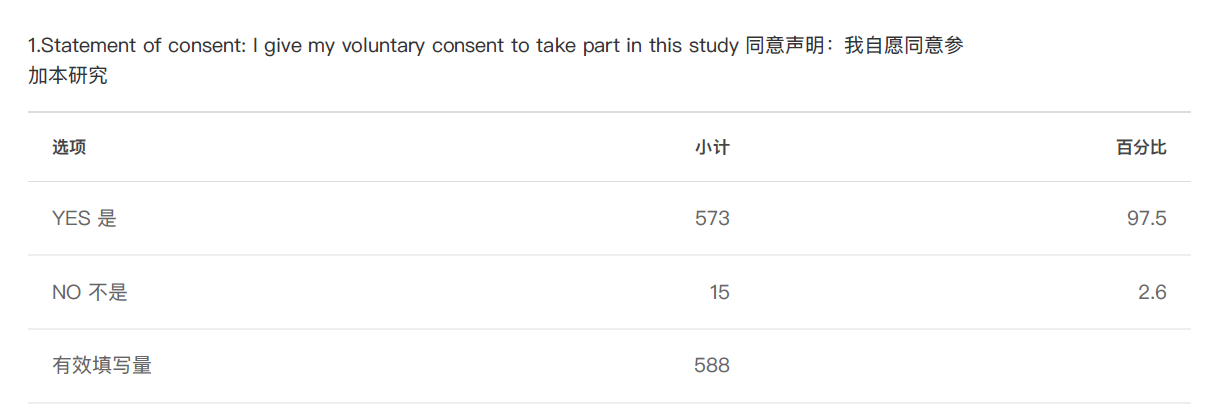
According to the illustration above, all but 15 respondents gave their consent to participate in the study. Those who did not give their consent were terminated from the research investigation.
Age
Age was the first variable explored in the study and it was categorised into four key groups, which are “18 years – 30 years,” “30 years – 40 years,” “40 years – 50 years,” and “50 years or older.” The results are highlighted below.
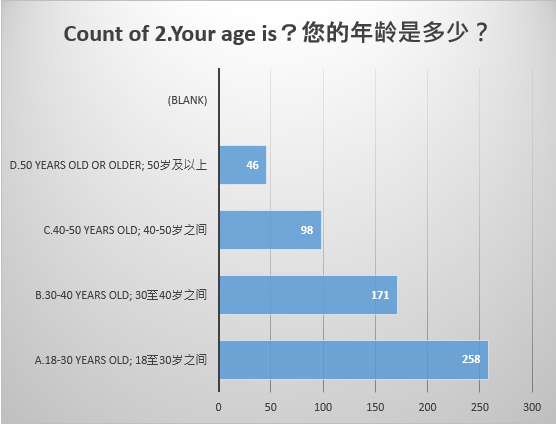
According to figure 4.2 above, a majority of the respondents were between the ages of 18 years to 30 years. The second largest group of respondents was comprised of informants who were between the ages of 30 years and 40 years, followed by those who were between 40 years and 50 years. The smallest number of respondents was comprised of those who were older than 50 years. A computation of these findings in percentages appears in figure 4.3 below.
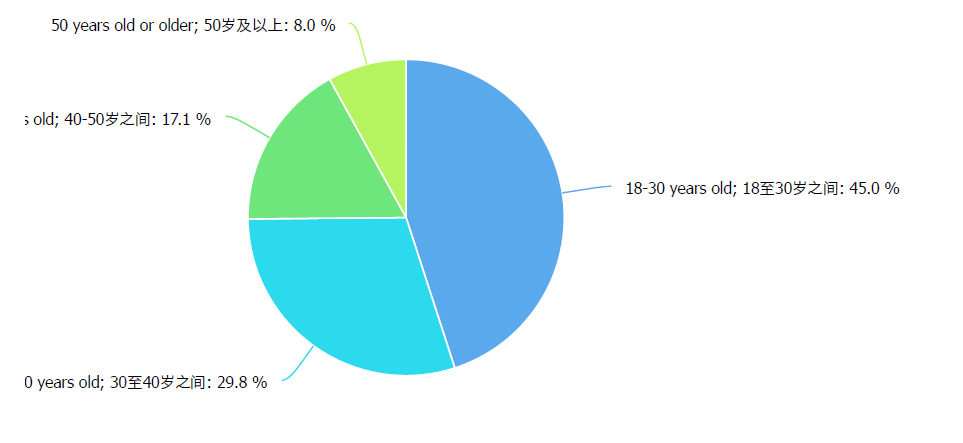
Broadly, the above findings show that a majority of the respondents were relatively young because they were under 30 years. This finding is further affirmed by the fact that older respondents accounted for the smallest number of respondents.
Gender
The second demographic variable explored in the study related to the respondents’ gender. Two categories were provided: male and female. The findings are as highlighted below in figure 4.4 below.
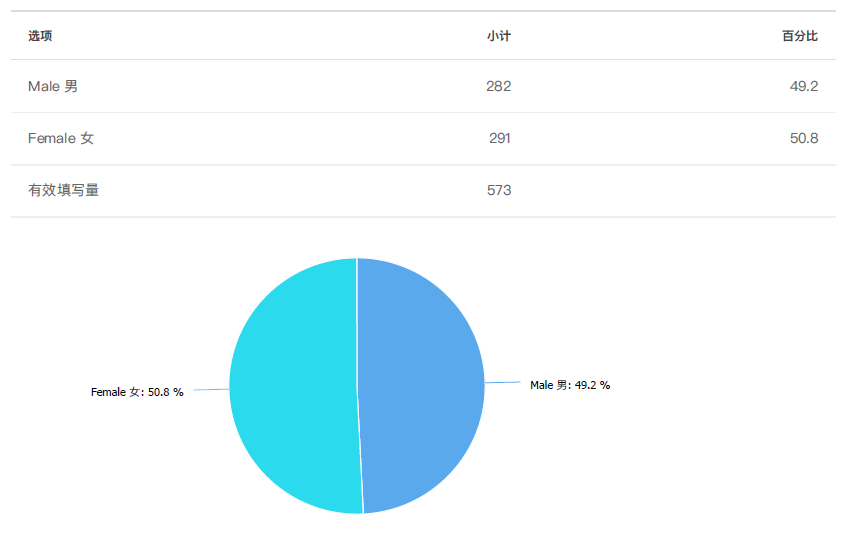
According to the above analysis, there was an almost equal number of respondents from both genders. Males were 282, while female respondents were 291. Collectively, 573 respondents took part in the investigation. Broadly, the above statistics imply that the findings presented in this report were representative of both genders.
Familiarity with Airbnb
Another question explored in the questionnaire referred to the participants’ familiarity with Airbnb. Here, the respondents were required to state whether they “never heard of,” “heard of, but barely,” “heard of, but not familiar,” “heard of and familiar,” and “heard of and very familiar.” The findings are highlighted in figure 4.5 below.
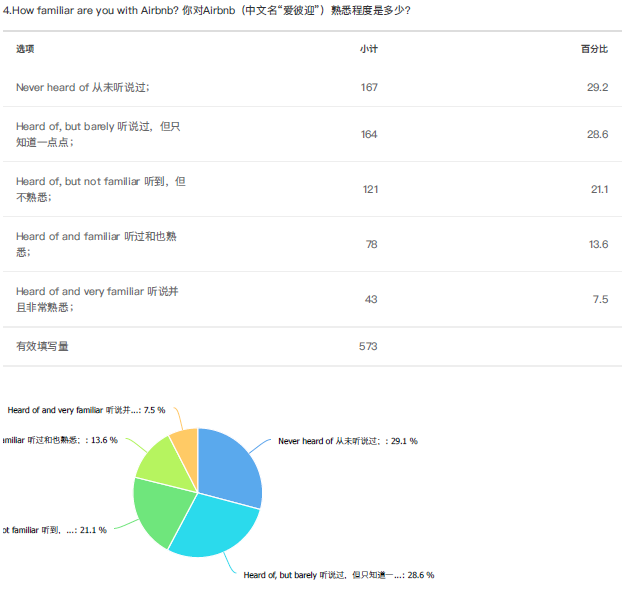
Based on the above statistics, most of the respondents (167 people) appeared not to have heard of Airbnb before. The population of participants who had barely heard of Airbnb was also high because they were 164 people. Broadly, these statistics show that there was a low sense of awareness about Airbnb in China.
Use of Airbnb
Another aspect of analysis investigated in the study was whether the respondents had used Airbnb before. Here, they were supposed to respond as either “yes” or “no.” About 385 respondents said they had used the service, while 188 of them said they had not used it. The results are highlighted in figure 4.6 below.
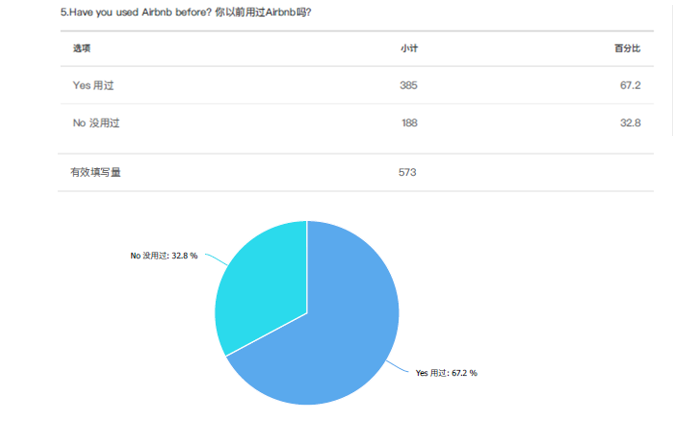
Respondents who said they had used Airbnb before were further asked to state the last time they had used the service. Their responses were categorised into four key criteria, which were “within the past six months,” “six months to a year ago,” “a year to two years ago,” and “more than two years ago.” The findings are highlighted in figure 4.7 below.
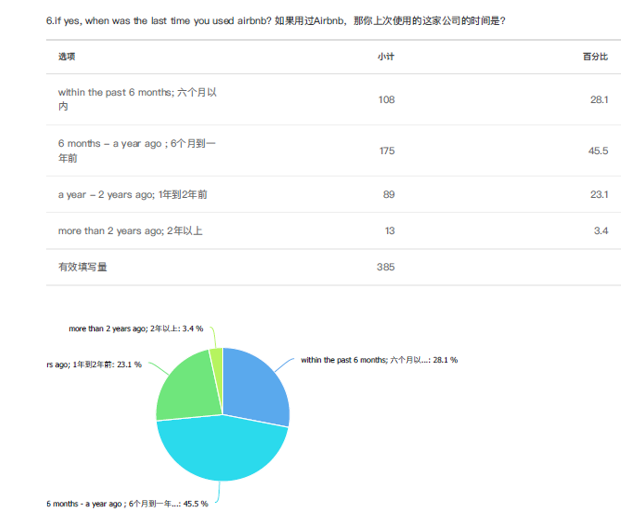
Factors That Influenced the Acceptance of Airbnb among Chinese Consumers
Accommodation Experience
In the first part of the assessment, respondents were asked to report on their accommodation experience. In the first statement, the informants were asked to state whether staying in Airbnb homes was enjoyable. The results are depicted in figure 4.8 below.
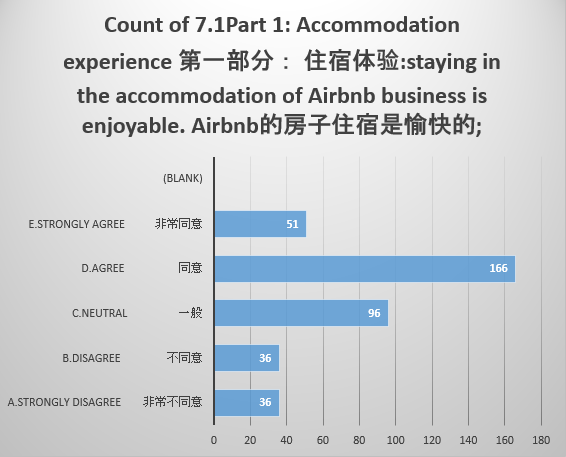
When the respondents were asked to state their opinions regarding the variety of accommodation options at Airbnb, most of them “agreed” that the variety of Airbnb accommodation options were interesting. Figure 4.9 below summarises these findings.
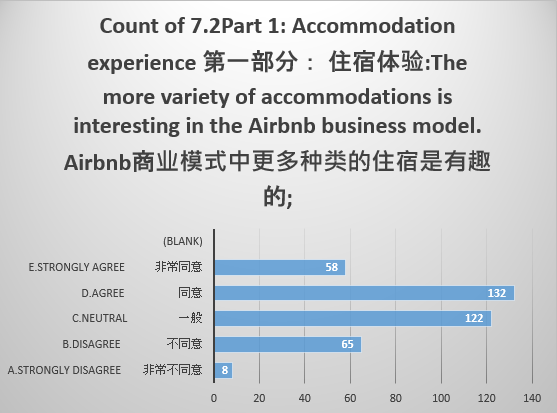
According to the diagram above, it can be generalised that a majority of the respondents agreed with the view that the variety of accommodation options was an interesting factor associated with Airbnb.
The third aspect of analysis relating to the respondents’ accommodation experience of Airbnb sought to find out whether local activities associated with Airbnb are exciting. The findings are summarised in figure 4.10 below.
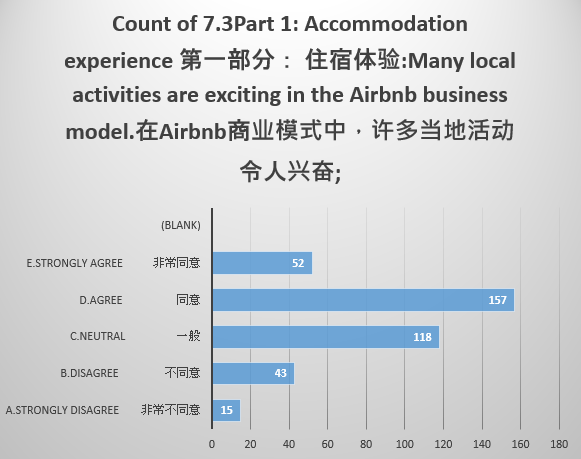
The last part of the analysis that examined the respondents’ views about Airbnb experiences sought the participants’ views about the intimacy provided by the Airbnb business model. The findings are highlighted in figure 4.11 below.
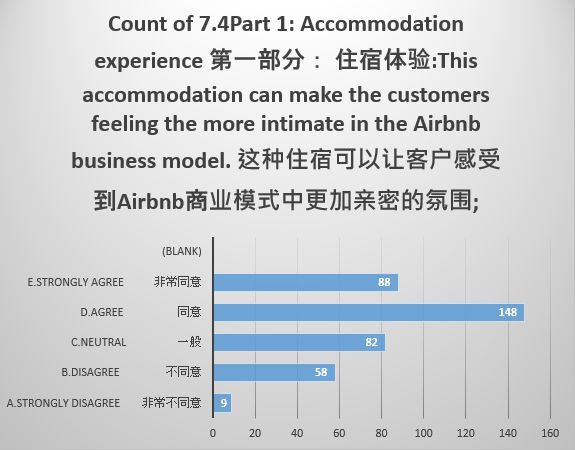
A summary of the four statements relating to the respondents’ accommodation experience appears in figure 4.12 below.
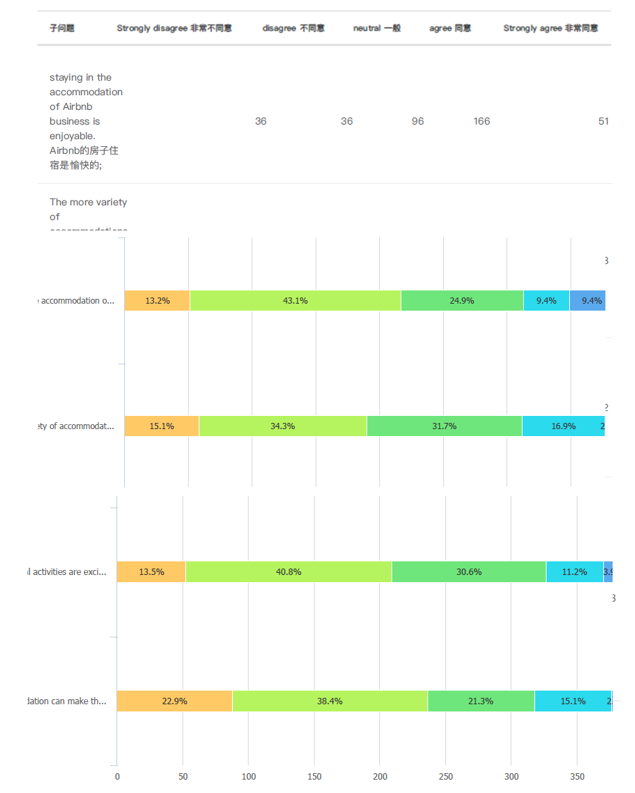
Generally, the above illustration shows that the respondents had a favourable experience of the accommodation experience offered by Airbnb because they deemed its services to be (largely) enjoyable, interesting, exciting, and intimate.
Social Needs
The second part of the questionnaire explained the social needs of the respondents concerning Airbnb. Here, the informants were asked to react to five statements. In the first statement, the researchers were largely “neutral” about the statement “Airbnb business model allows me to get insider tips on local attractions.” Figure 4.13 below summarises the findings.
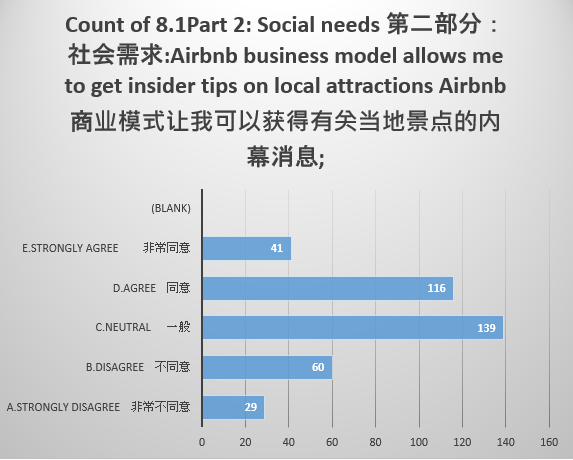
In the second statement, they were supposed to react to whether Airbnb gave them a meaningful experience. Figure 4.14 below summarises the findings.
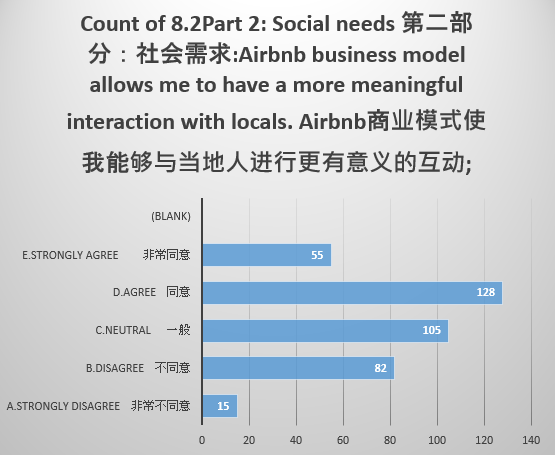
The respondents were also asked to give their views about how Airbnb allowed them to know people from their local neighbourhoods. The findings are summarised below.
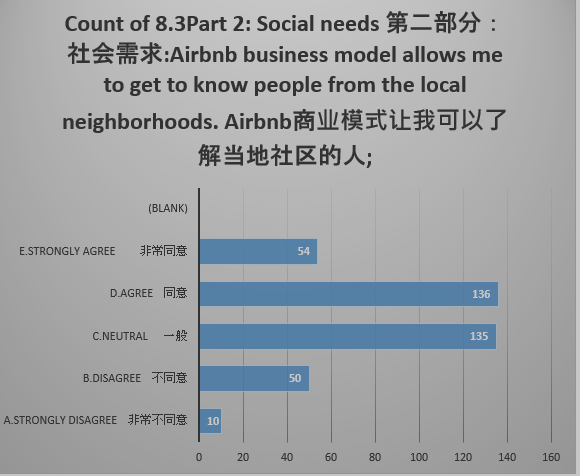
According to figure 4.15 above, most of the respondents agreed with the fact that the Airbnb business model allowed them to know people from the local neighbourhood. When they were asked to give their views concerning Airbnb’s ability to help its users develop social relationships, most of them agreed with this statement. Figure 4.16 below summarises these findings.
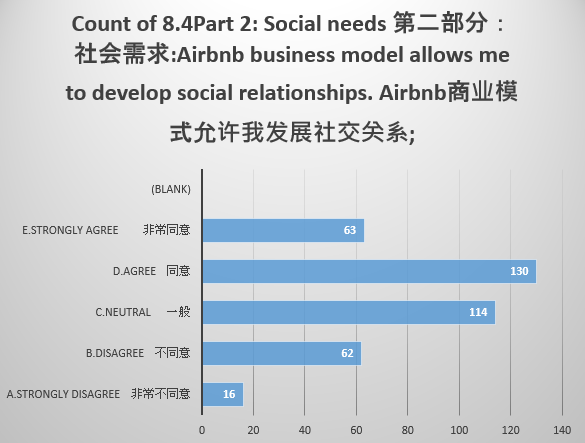
The last part of the analysis investigating the social effects of Airbnb sought to find out the respondents’ views regarding the company’s ability to help people connect with locals. The findings are summarised below.
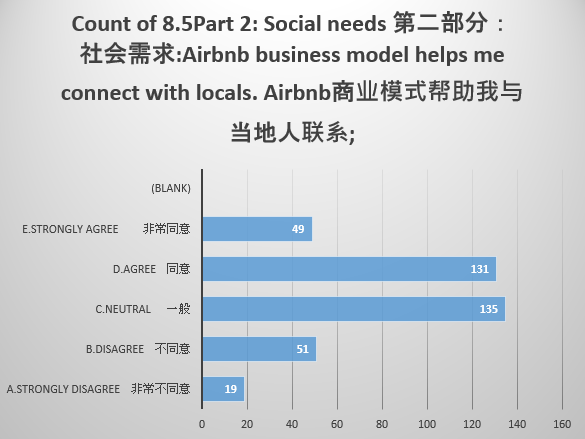
According to figure 4.17 above, those who “agreed” and were “neutral” about the above statement were overwhelmingly higher than those who disagreed with the same. Figure 4.18 below summarises the findings for all the statements described above.
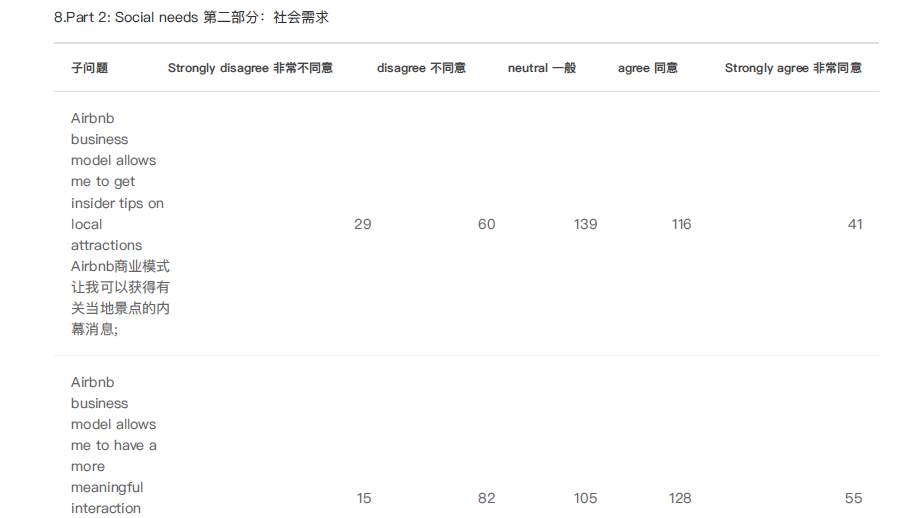
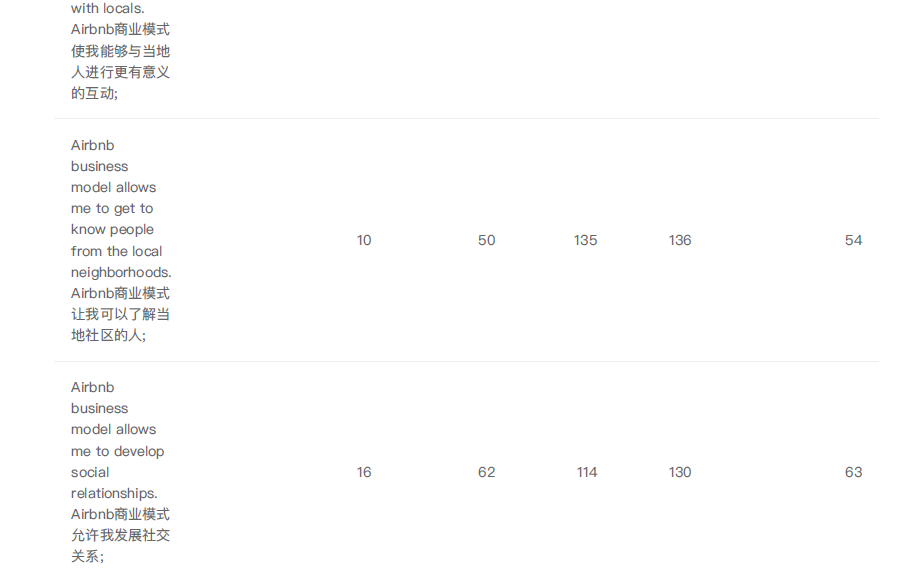

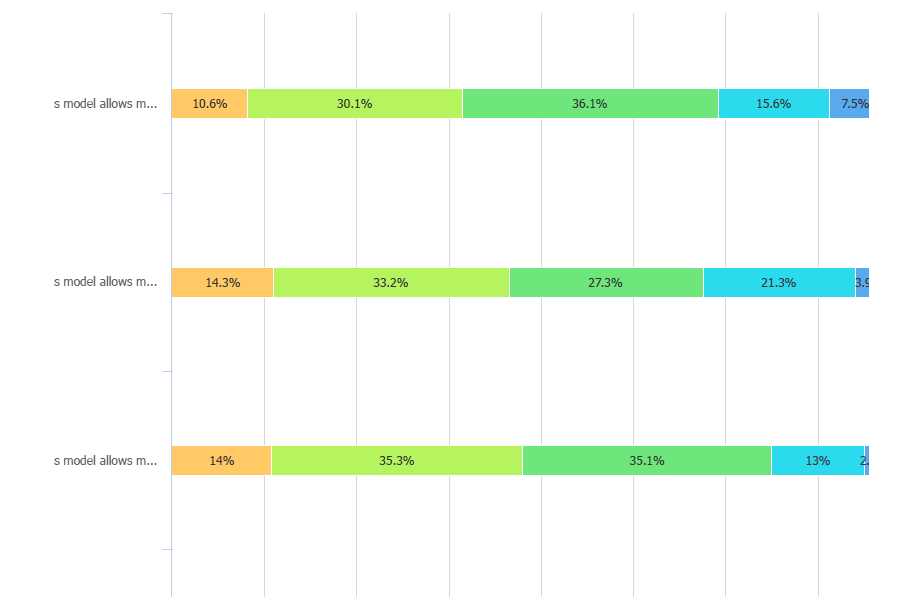
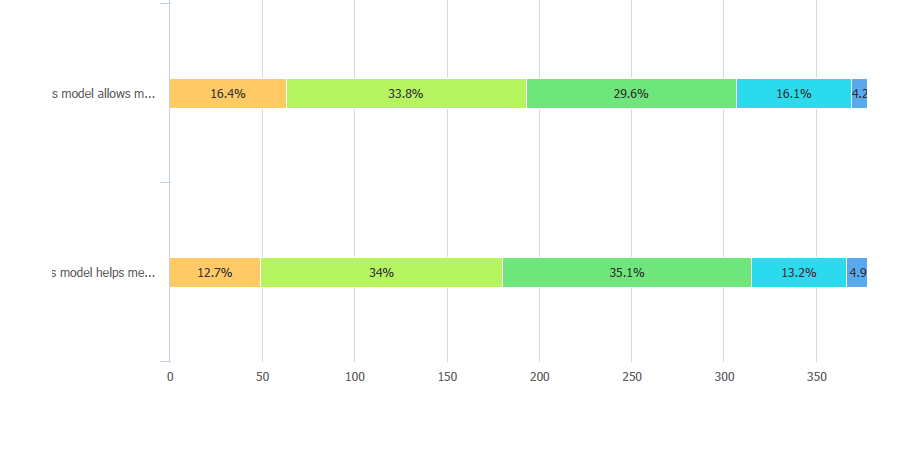
Overall, based on the illustration above, it is assumed that the majority of the informants agreed with the view that Airbnb’s business model created a relatively significant social value to its users.
Price
The respondents were asked to react to the statement, “Airbnb business model benefits me financially.” The findings are summarised below.
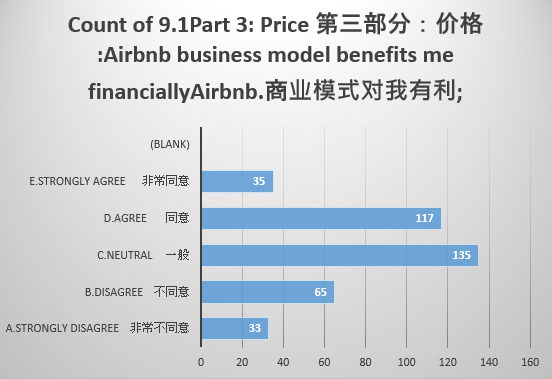
According to figure 4.19 above, most of the respondents were neutral about the ability of Airbnb to improve their financial situation. Alternatively, from a consumer perspective, the respondents were supposed to react to Airbnb’s ability to lower travel costs. The findings are highlighted in figure 4.20 below.
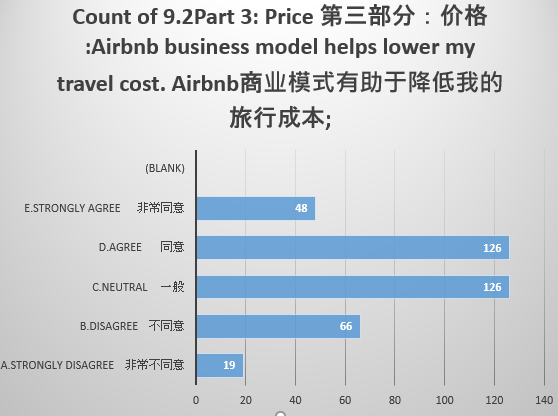
According to the graph above, most of the respondents agreed with the fact that Airbnb lowered their travel costs. When they were required to state their views regarding whether the company was a better economic choice compared to hotels, most of them agreed that the service was a better choice to traditional accommodation options. Those who felt this way were 126 people out of the total sample of participants who took part in the study. These results are summarised in figure 4.21 below.
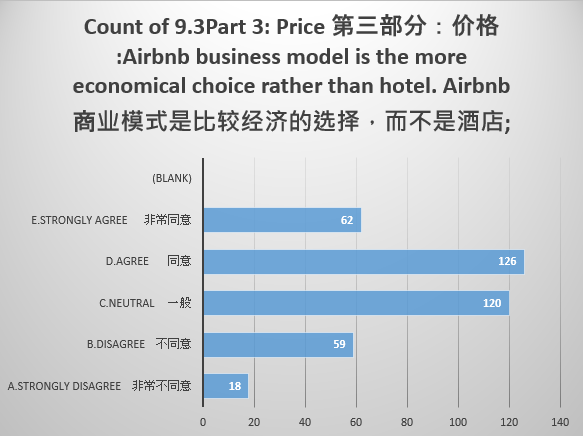
A summary of the findings relating to the three statements analysed above appear in figure 4.22 below.
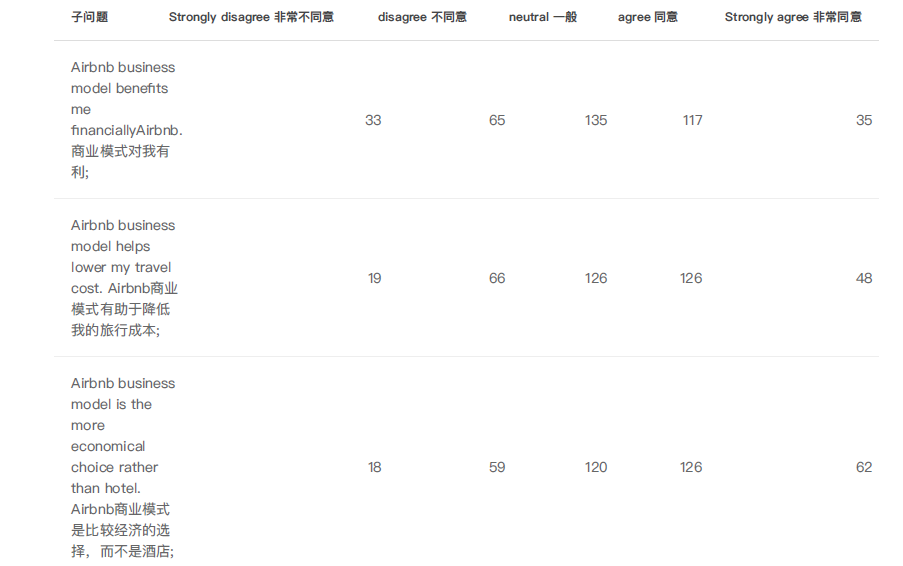
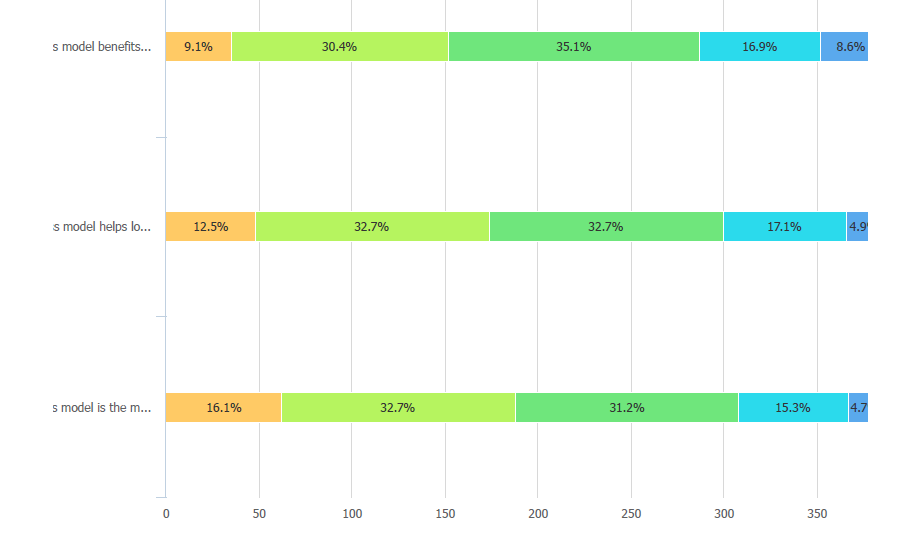
Relative to the above findings, it can be deduced that most of the participants felt that Airbnb has a strong price value.
Security
Issues pertaining to security on the Airbnb platform were also explored as part of the investigation into the factors that influenced the acceptance of Airbnb among Chinese customers. Findings relating to respondents’ ability to stay in a stranger’s house are highlighted in figure 4.23 below.
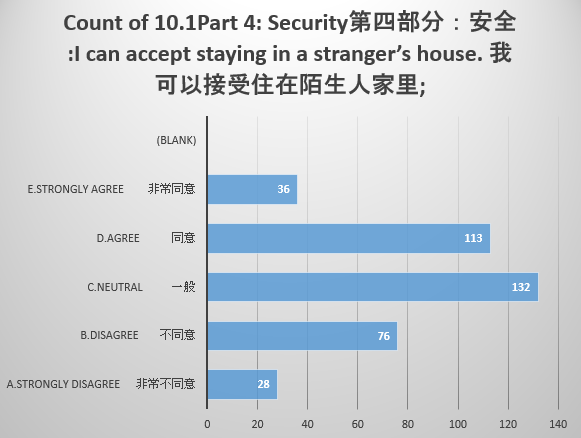
According to the graph above, most of the respondents were neutral about staying in a stranger’s house. The next phase of analysis involved an evaluation of the respondents’ views regarding a sense of security associated with staying in the Airbnb accommodation. The findings are summarised in figure 4.24 below.
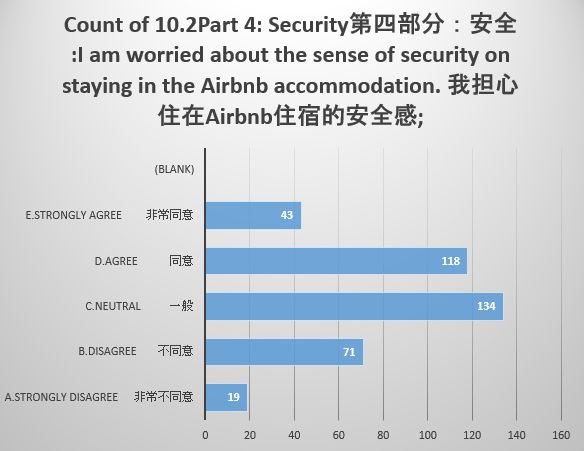
The respondents’ views regarding the hygiene facilities offered in Airbnb platforms are summarised in figure 4.25 below.
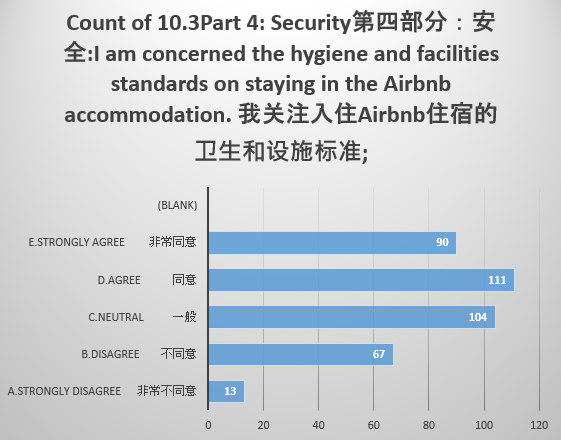
The last aspect of security investigated in the study related to personal information provided on the Airbnb platform. Most of the respondents agreed with the view that the provision of personal information on the service was worrisome. The findings are summarised in figure 4.26 below.
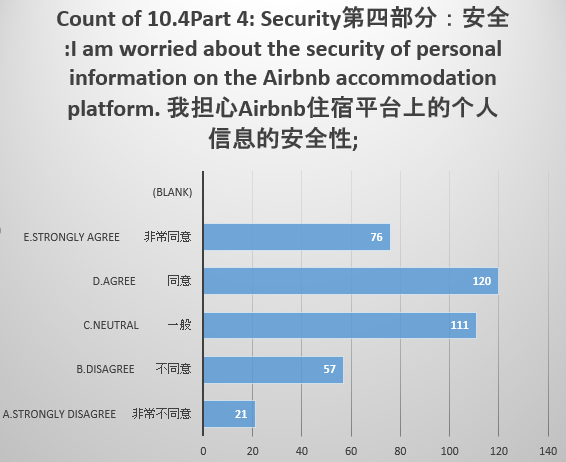
A summary of the four statements analysed above is presented in figure 4.27 below.

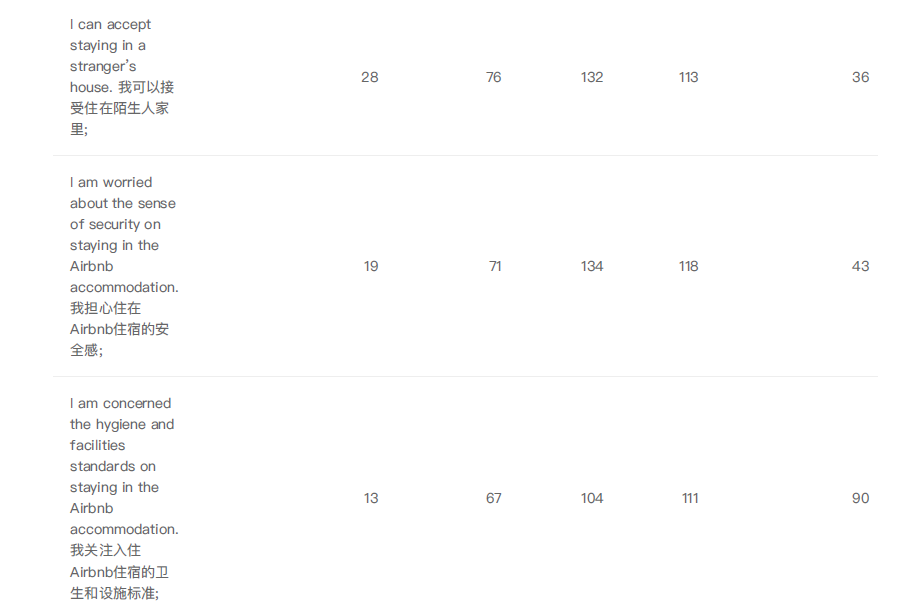
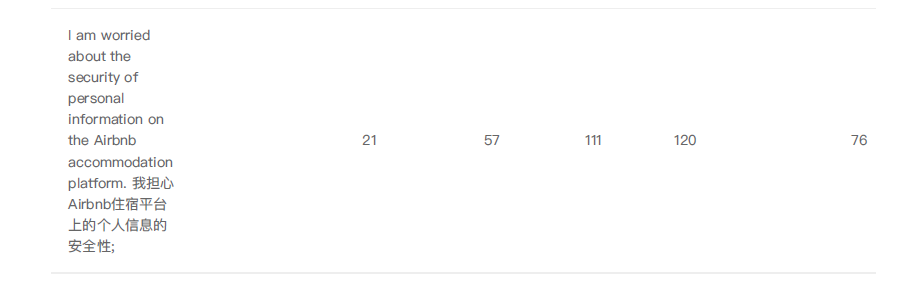
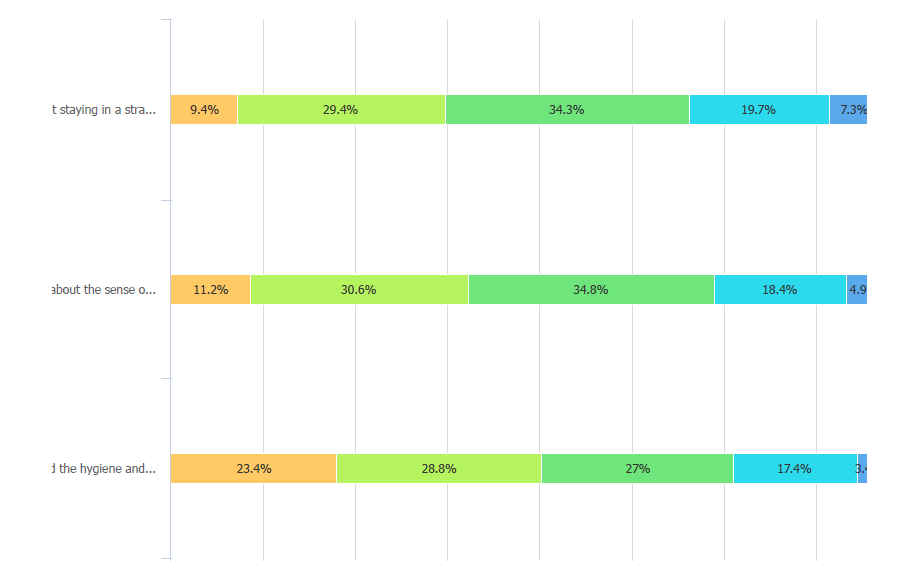

Based on the analysis above, it is important to point out that most of the respondents were concerned about the security provided on the Airbnb platform.
Platform Experience
The fifth part of the investigation concerned the participants’ acceptance of Airbnb’s services as an offshoot of their platform experience. Figure 4.28 below shows findings relating to the first statement, which sought to find out the respondents’ views regarding the ambiguity of information provided on the Airbnb platform.
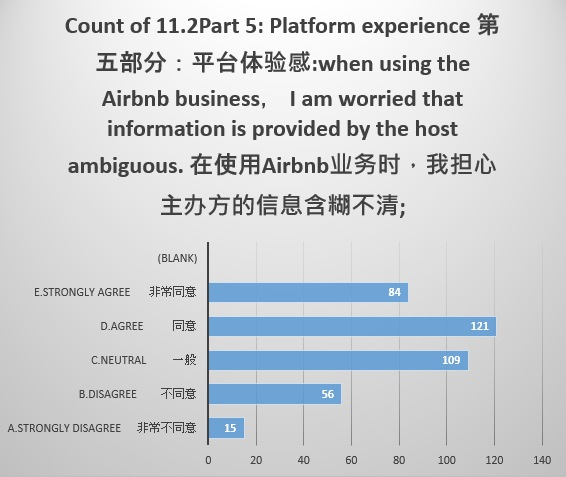
Relative to the findings depicted above, most of the respondents agreed with the view that they were worried about the possible ambiguity of information provided by Airbnb hosts. The other aspect of analysis investigated in this section of analysis related to the time taken for hosts to confirm bookings. The respondents were asked to react to the statement, “I am worried that it will take too much time to wait for confirmation from the host.” The results are depicted in figure 4.29 below.
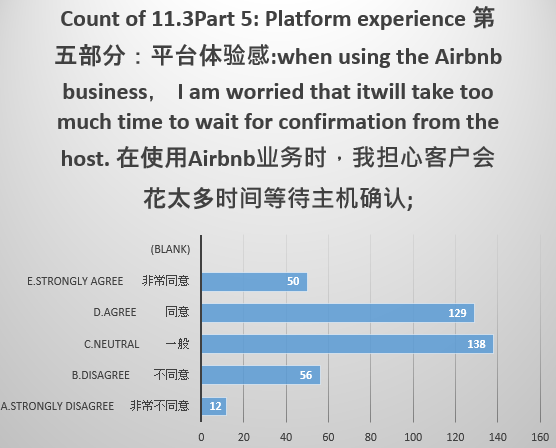
As seen from the graph above, a majority of the respondents (138 people) were “neutral” about the above-mentioned statement. The second largest group of participants was comprised of those who agreed with the same statement. It was made up of 129 respondents. The third largest group of informants disagreed with the above view, while the fourth largest group “strongly disagreed” with the idea. The smallest group of respondents was comprised of those who “strongly disagreed” with the above statement. This group was made up of 12 people. Broadly, it could be assumed that most of the respondents held “neutral” views about the fact that some Airbnb hosts took too much time to confirm their bookings.
The other aspect of the analysis that was investigated in the study related to the payment process of Airbnb. Here, the respondents were asked to give their views regarding whether Airbnb’s payment process would be troublesome. The findings are highlighted in figure 4.30 below.
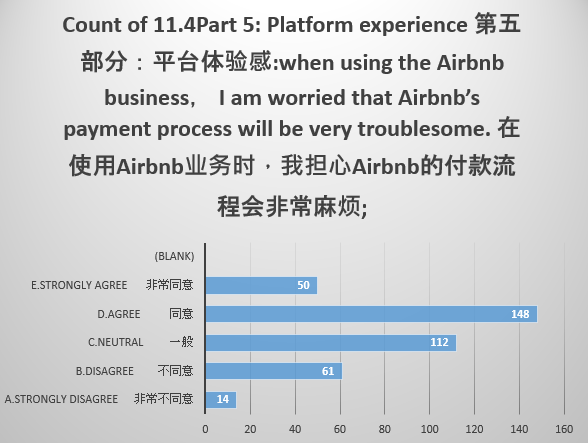
According to the findings depicted above, a majority of the respondents agreed with the view that Airbnb’s payment process would be troublesome. Those who held such views were 148 people. The second largest group of respondents was comprised of those who held neutral views regarding the same idea. It was made up of 112 people. The third largest group of respondents consisted of informants who “disagreed” with the same statement, while the fourth largest group was comprised of those who strongly disagreed with it. Both groups had 61 and 50 people, respectively. The smallest cohort of respondents was comprised of people who “strongly disagreed” with the statement. It was made up of only 14 respondents. A summary of the findings of the four statements highlighted above is depicted in figure 4.31 below.

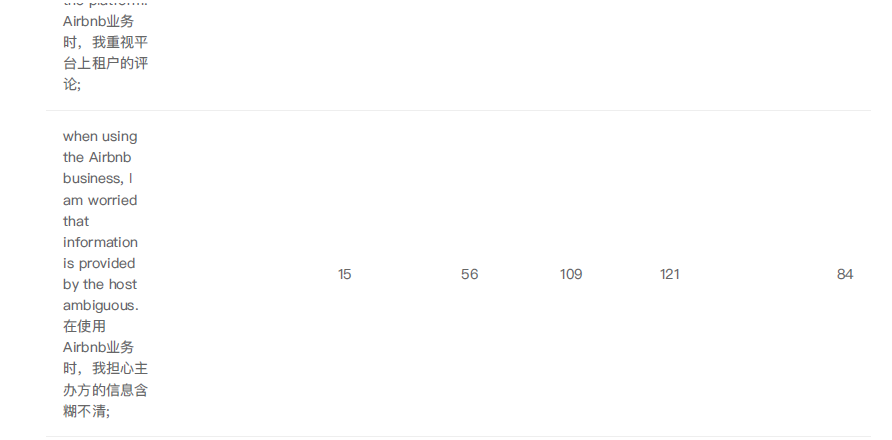
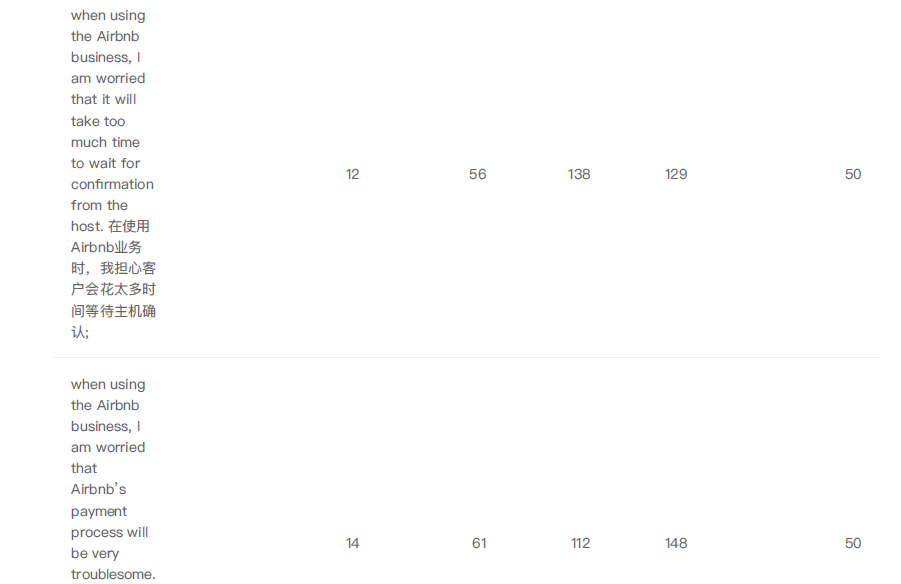
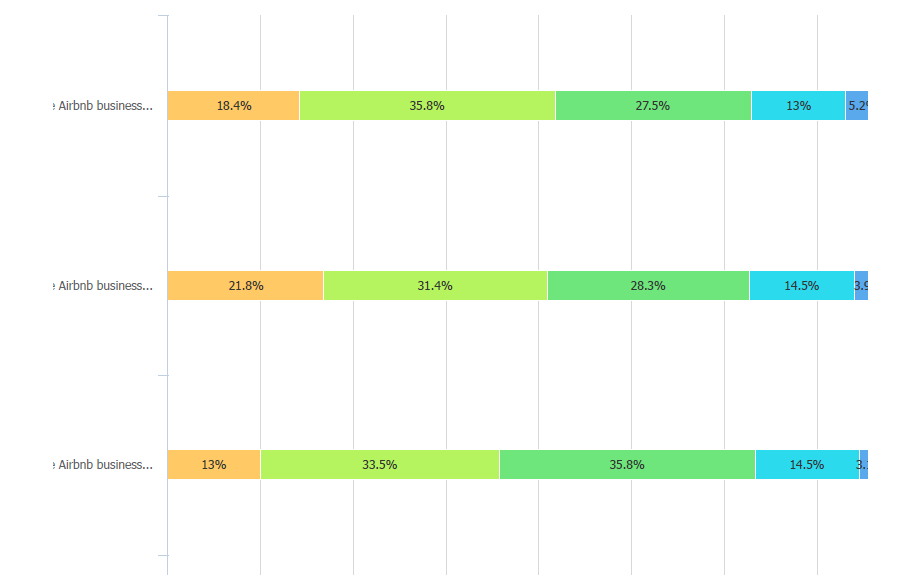

Comprehensively, it could be deduced that the participants felt that Airbnb’s platform experience was unsatisfactory
Attitudes about Airbnb
The other aspect of analysis relating to the acceptance of Airbnb among the research participants was focused on understanding their attitudes about the business. In this analysis, the informants were supposed to respond to four questions, which stated, “What about the accommodation staying experience in Airbnb business?” “What about the social needs of Airbnb business?” “What about the Price in Airbnb business?” and “What about the sense of security in Airbnb business?” Their responses varied on a scale of one to five where “bad” equalled to one point and “good” equalled to five points.
The findings for the first statement, which investigated the accommodation staying experience at Airbnb showed that most of the respondents said it was relatively good because the most dominant reactions were between two and three points. Figure 4.32 below outlines these findings.
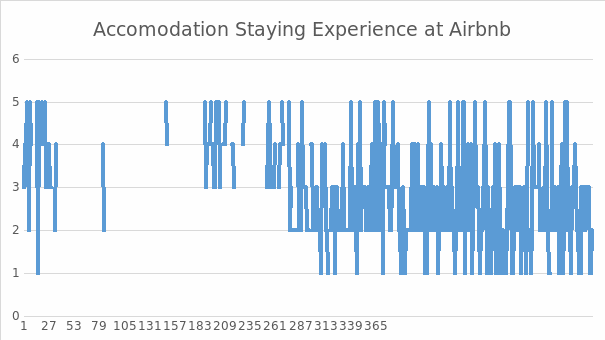
The other aspect of analysis investigated in the report related to social needs. According to figure 4.33, a majority of the respondents held “neutral” views regarding this aspect of analysis because a bulk of the reactions were between two and four points.
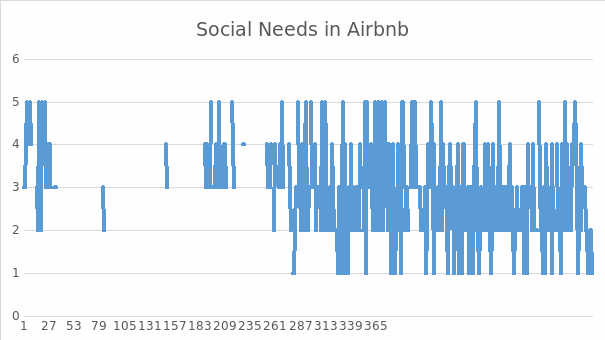
The respondents also generally had favourable views regarding the price of Airbnb accommodation options because a bulk of the reactions were between two and three points. A similarly high number of respondents held neutral views about the research issue. The findings are summarised in figure 4.34 below.
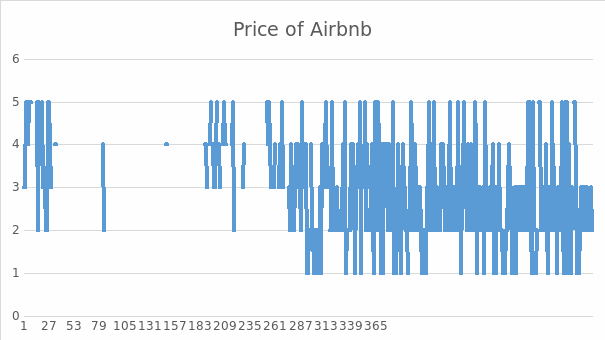
The last part of the analysis that explored the participants’ attitudes towards Airbnb focused on investigating the respondents’ perceptions of security regarding Airbnb. Based on the findings of figure 4.35 below, a slightly higher number of people held favourable views regarding the company’s security compared to those who held “neutral” views about the same. This finding stems from the bulk of responses, which were categorised between two and three points, compared to those that were within three and four-point range.
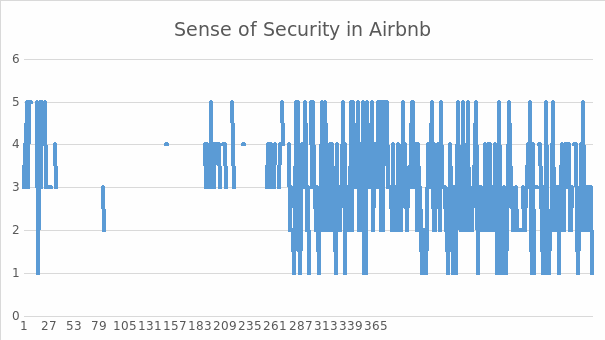
A summary of the above-mentioned statements appears in figure 4.36 below
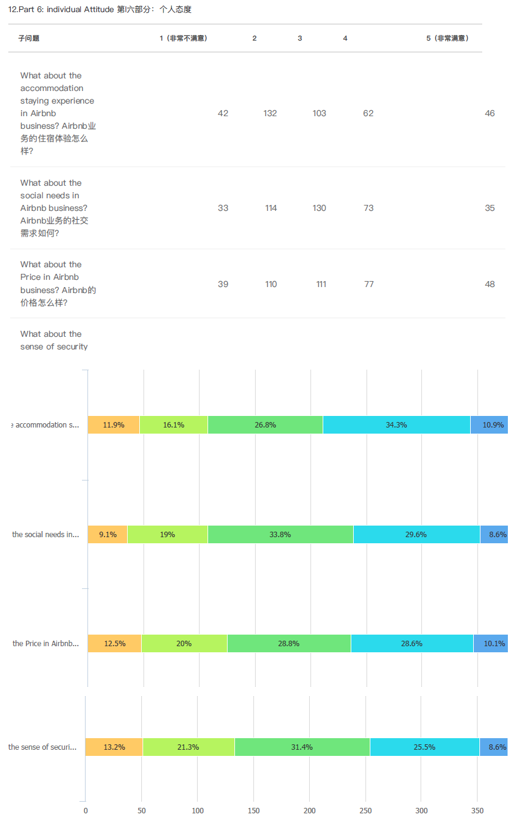
Future Intention
The last part of the questionnaire explained the intention of the participants regarding the use of Airbnb. The participants were supposed to react to three statements, which included, “Overall, I still think Airbnb is a good accommodation option in the future,” “I am willing to recommend Airbnb to my friends in the future,” and “I expect to continue using Airbnb business in the future.” The findings relating to the first statement (“Overall, I still think Airbnb is a good accommodation option in the future”) shows that a majority of the respondents had favourable views of it. In other words, they believed that Airbnb was a good accommodation option for the future.
About 210 respondents felt this way. The second largest group of respondents held neutral views about the same idea. They comprised 193 people. The third largest group of respondents “strongly agreed” with the statement, while the fourth largest group of informants “disagreed” with the same. The smallest cohort of respondents “strongly disagreed” with the statement. It was made up of 30 respondents. The findings are summarised in figure 4.37 below.
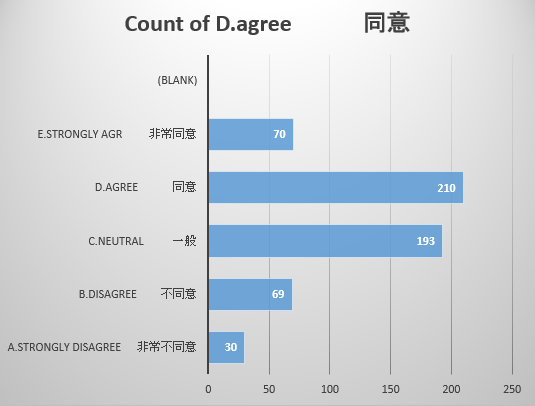
When the research participants were required to state whether they would recommend Airbnb to friends in the future, the number of people who agreed or held neutral views about the same statement was almost equal (199 people vs. 201 people). The third largest group of respondents “strongly disagreed” with this view. It was comprised of 79 participants. The fourth largest cohort of respondents disagreed with the same idea. It was comprised of 74 people. Those who “strongly disagreed” with the same view formed the smallest group of informants, which comprised of 20 people. The findings are summarised in figure 4.38 below.
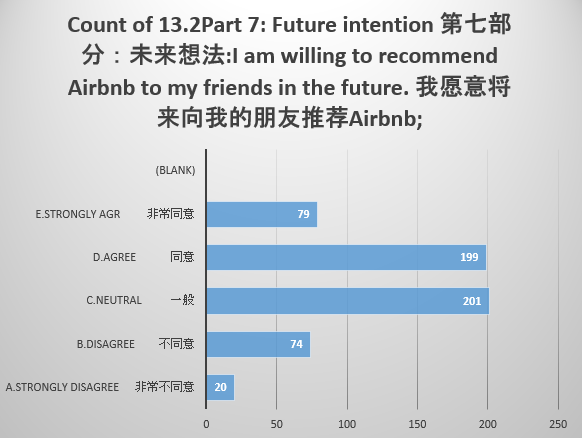
Findings relating to future intention of using Airbnb are summarised in figure 4.39 below.
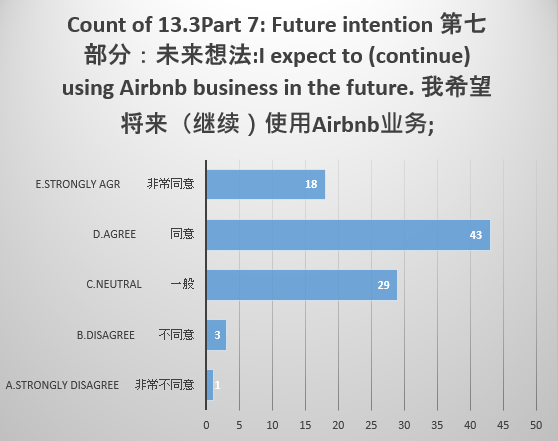
A summary of the three statements highlighted above appears in figure 4.40 below.
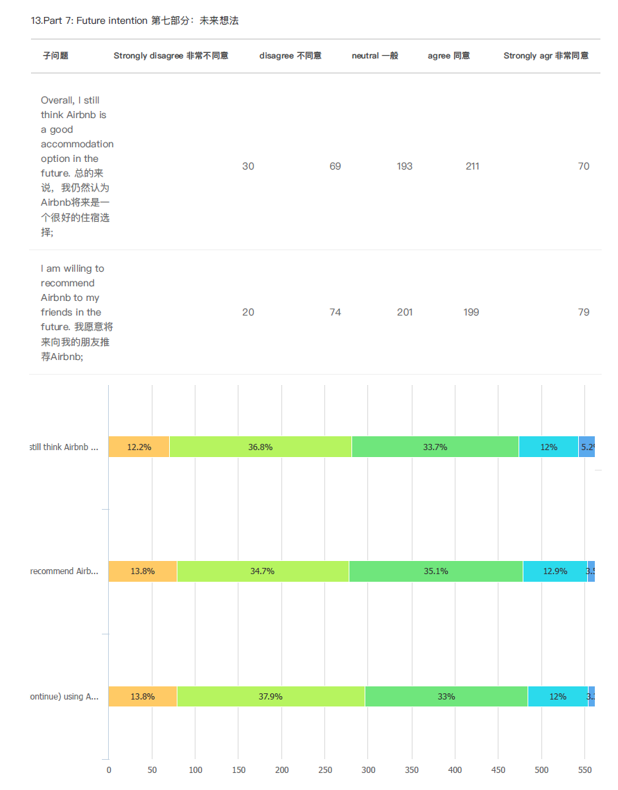
Conclusion and Recommendations
Conclusion
To recap, the purpose of this research was to evaluate the current strategy of peer-to-peer accommodation companies, with Airbnb providing the study context. The investigation was intended to improve the company’s performance in the Chinese sharing economy market. Three key research objectives guided it. They were designed to identify factors influencing Airbnb’s business performance in the Chinese Market, to understand the nature of relationships that exist between factors affecting consumer choices of Airbnb’s as well as the company’s performance, and to explore new ways of how customers in the Chinese market can better accept and sustain the company’s operations in the country.
The findings of this study reveal that Airbnb has an opportunity to redeem its business in the Chinese market because the respondents held a positive view about some of the company’s operations. For example, when they were asked to state their views about the intimacy provided by Airbnb accommodation options, most of them (148 people) agreed with the view that Airbnb provided customers with an intimate experience during their stay.
Those who “strongly agreed” with the same view characterised the second largest group of respondents. They were 88 informants who felt this way. Those who held “neutral” views about the same statement were 82 people, while those who “disagreed” with the same were 58. The smallest number of respondents “strongly disagreed” with the above statement. They were nine in number.
The research participants were also asked to state whether Airbnb allowed them to have a meaningful experience with the locals. A majority of them (128 people) agreed with this view. The second largest group of respondents (105 people) held neutral views about the same statement, while the third largest group of respondents disagreed with this opinion. Those that “strongly agreed” and “strongly disagreed” with this view were 55 and 15 respondents, respectively. They comprised the fourth and fifth largest groups of respondents.
The positive views held by the respondents about Airbnb were also replicated in the opinions of the respondents’ regarding the level of excitement they felt when using the platform. A majority of them “agreed” with the statement that local activities associated with Airbnb are exciting. Those who felt this way formed the largest group of respondents comprising 157 people. The second largest group of participants was comprised of those who held “neutral” views of the same statement. It was comprised of 118 respondents. The third largest group of informants was made up of those who “strongly agreed” with this statement. It was comprised of 52 people.
The fourth largest group of informants consisted of those who “disagreed” with the statement. They were 43 people. Lastly, the smallest group of respondents was comprised of 15 participants who “strongly disagreed” with the above-mentioned statement. In sum, most of the participants agreed with the fact that many local activities are exciting in the Airbnb business model.
The same favourable views about Airbnb were also supported by the willingness of the respondents to use Airbnb in the future. This statement was buoyed by findings represented in figure 4.40, which showed that most of them agreed with the view that they would continue to use Airbnb in the future. Those who held a neutral view formed the second largest group of respondents, which was comprised of 29 people. The third largest group of participants “strongly agreed” with the statement, while the fourth largest group was made up of three respondents who “disagreed” with the idea. The smallest group of participants was comprised of one person who “strongly disagreed” with this view.
Some issues that emerged as being of concern to the research informants included security, hygiene, and an unsatisfactory user experience. According to figure 4.24, which was highlighted in chapter 4, most of the respondents were neutral about the idea that the security provided in Airbnb accommodation options worried them. Respondents who felt this way were 134. They formed the largest group of informants in the sample. The second largest group was comprised of those who agreed with the same statement. It was comprised of 118 people. The third largest group of informants was made up of those who disagreed with the view that Airbnb’s security was worrisome.
They comprised 71 respondents. Comparatively, those who “strongly disagreed” with the same view were relatively smaller in number (43 respondents). The last group of respondents said they strongly disagreed with the same idea. Comprehensively, it can be assumed that a majority of the participants were concerned about security concerns pertaining to Airbnb accommodation options.
Hygiene factors were also investigated in the analysis and it was established that most of the respondents were concerned about its standards when staying in Airbnb facilities. Those who felt this way were 111 people and they formed the largest group of participants. Comparatively, those who held “neutral” views about the same issue formed the second largest group of respondents (104 people), while those who “strongly agreed” with the same position formed the third largest group of informants (90 people). The fourth largest group of participants was made up of those who “disagreed” with this view (67 people), while the smallest cohort of respondents was made up of those who “strongly disagreed” with the same idea. These issues can be broadly traced to concerns about slow user experiences, especially regarding the lack of direct communication with respondents.
Broadly, the findings highlighted in this study show that Airbnb’s Chinese business is at crossroads because the respondents generally held mixed reviews about its operations. For example, most of them were still uncertain about specific aspects of its operations, such as security and hygiene issues. At the same time, there were also concerns that the service provided a low quality user experience. It is also important to note that there was a general low sense of awareness about its products among the respondents.
Alternatively, evidence also shows that the company had a strong social value to the informants because it made them connect well with their environment and with other people. The informants also said that the company has a strong price value because of its ability to generate additional income. These findings support the success of the company, which has been highlighted in previous chapters of this document.
For example, they have suggested that these reasons explain why the company has made a name for itself as one of the fiercest rivals for traditional hotel businesses. Indeed, its threat in the market could largely be attributed to its capacity to provide customers with alternative accommodation options, different from the traditional hotel business model, where customers book a room and eat at a restaurant (Hofacker, Malthouse & Sultan 2016). Concisely, Airbnb provides a different type of accommodation to customers because it accords them a “homely” experience (Airbnb Incorporated 2017). Consequently, the company operates as an online marketplace where prospective clients view listings and contact apartment or homeowners to book residences for short and long-term stays.
Therefore, this business model allows property owners to lease out their houses for short-term or long-term stays. The findings highlighted in this study also suggest that the different kinds of accommodation options offered on the platform (apartments, cottages, and holiday homes) add value to their experiences. At the same time, it is important to remember that the company does not own any of these properties. Similarly, it does not arrange for tours.
Instead, its business model is agency-based where it takes a specific fee for every booking made on the platform (Airbnb Incorporated 2017). The findings highlighted in this report also make it easy to understand why the more than 5 million listings published on the platform generate billions in revenue for the California-based firm (Airbnb Incorporated 2018a). They also explain why the company’s market presence is spread across more than 81,000 cities and 190 countries around the world and why it has facilitated more than 300 million check-ins since its inception (Airbnb Incorporated 2018a).
Since Airbnb is known for providing customers with a different experience from traditional hotels, its global rise in the industry has been nearly unstoppable because of the conveniences highlighted by some of the participants consulted in this report. Indeed, as Hempel (2018) points out, from the time the first listing was published in 2008, the company has been able to scale the heights of success that most technology companies have failed to reach. Consequently, estimates show that the San Francisco-based organisation is worth more than $24 billion and this figure is expected to rise in the future (Hempel 2018).
The above-mentioned information can be used to answer the research questions of this paper. For example, the second question sought to find out what kind of factors influenced the relationship between Airbnb’s performance in the Chinese market. Relative to the findings gathered from this report, it could be deduced that the fifth, sixth, seventh, eighth and ninth hypotheses that were linked with the second research question were all true. This is because it was established that the respondent’s accommodation experience had a positive and close relationship with the Chinese consumers’ attitude towards Airbnb and its performance in the Chinese market.
It was also established that the guests’ sense of security had a positive and close relationship with their attitude towards Airbnb and, by extension, its performance in the Chinese market. Within the same analysis, the company’s user experience emerged as having a positive and close relationship with the guests’ attitude towards Airbnb and its performance in the Chinese market. Lastly, it was also established that the cost of accommodation in Airbnb has a positive and close relationship with the Chinese consumers’ attitude towards Airbnb and, by extension, its performance in the Chinese market.
The findings highlighted in this study also reveal that the first four hypotheses mentioned in the third chapter of this study are true. Stated differently, it was established that accommodation experiences significantly affected the attitudes of Chinese consumers’ towards Airbnb, thereby influencing the company’s performance in the Chinese market. The findings of this study also demonstrate that the perceptions of security significantly affect the attitudes of Chinese consumers’ towards Airbnb, thereby influencing its performance in the Chinese market.
The same is true for user experiences because it was established that it significantly affects the attitudes of Chinese consumers’ towards Airbnb and its performance in the Chinese market. Lastly, the same findings support the view that the price of accommodation significantly affects the attitudes of Chinese consumers towards Airbnb and, by extension, the performance of the company in the market.
The findings highlighted in this study could be explained by the views of Custer (2018), which presuppose that the failure of Airbnb to make a meaningful impact on the Chinese market is cultural. In other words, this paper’s findings seem to reinforce the belief that Airbnb has not learned to address the needs, preferences and desires of Chinese users. In line with this discussion, Custer (2018) points out issues pertaining to trust, which is a big challenge impeding the success of sharing platforms in China because many people have a problem believing those who sell their products virtually.
Similarly, the Chinese have a problem with the email platform that is synonymous with Airbnb because they are often used to instant messaging platforms where they get a response when they make an inquiry (Custer 2018). At the same time, the Airbnb platform makes it difficult to contact a homeowner directly because all communications are channelled through the platform. Therefore, there may be issues relating to trust or miscommunication as the company maintains the right to edit or scrutinise such communications before they reach their intended audience. This messaging platform is unlike Tujia where the phone numbers of available homeowners are provided and a customer can message them directly.
The findings of this study also add merit to the arguments of Custer (2018) which suggest that part of Airbnb’s weakness has been the low speed at which it chose to enter the Chinese market. Reports show that the company only recently made the decision to venture into the market, thereby giving its competitors like Tujia a significant head start that they have used to perfect their business (Tujia entered the market in 2011 and has since built a strong brand following since then) (Custer 2018).
The entrenchment of its competitors means that for every Chinese city that Airbnb is present in; there is stiff competition from existing market entrants. Furthermore, most of these competitors have deeply entrenched business networks. Similarly, they have cultivated a sense of trust among the local populations. Therefore, it could be difficult for customers to choose Airbnb over local businesses.
Since this paper focuses on Airbnb’s operations in China, it is also important to point out the unique peculiarities of the Asian economy because there are many regulatory uncertainties, which may prevent the growth of the business. In fact, Custer (2018) suggests that the reason why China has not tightened its regulatory noose around the American-based Corporation is its minimum impact on the economy. Therefore, in future, it is important that the San Francisco-based Corporation operates legally. However, even this strategy could still be a difficult one to implement in a country where the rules are still fuzzy.
Comparatively, the positive reviews provided by the respondents about Airbnb could largely be attributed to the company’s positive impact on local communities. Indeed, according to its website, Airbnb acknowledges that most of its customers are drawn to its services because they want to experience their visits to new places, not as tourists but as locals (Airbnb Incorporated 2018b). In fact, the information provided on the same platform suggests that more than 90% of its clients want to experience travel adventures this way (Airbnb Incorporated 2018a). It is also reported that up to 75% of the properties listed on the company’s website are outside of the main districts.
Within the same population, it is also estimated that up to 79% of Airbnb guests want to explore a specific neighbourhood (Airbnb Incorporated 2018b). These statistics support a narrative that most of the company’s customers like to stay longer and spend more time and money in diverse cities or neighbourhoods. In fact, it is established that such types of customers typically spend up to 2.1 times more time in such neighbourhoods compared to less diverse ones (Airbnb Incorporated 2018b). Data on spending patterns also reveal that Airbnb customers often spend more money than typical visitors do (up to 2.1 times) (Airbnb Incorporated 2018b). About 42% of the same guests spend such money in the neighbourhoods where they reside in during their stay (Airbnb Incorporated 2018b). These findings explain why the respondents said Airbnb had a strong financial benefit to its users.
Indeed, reports show that listing properties on the platform has helped thousands of property owners to supplement their household incomes. About 81% of hosts who have benefitted this way share a part of their home to strangers (Airbnb Incorporated 2018b). A majority of them (52%) usually fall within the low or middle-income strata (Airbnb Incorporated 2018b). Again, a majority of the same number of respondents (53%) said that hosting helped them to stay in their homes (Airbnb Incorporated 2018b). Some of the income generated through Airbnb (about 48%) is also used to pay ordinary household expenses such as rent and groceries (Airbnb Incorporated 2018b). Broadly, the information provided in this chapter explains why the respondents had mixed reviews about the company’s performance in China.
Recommendations
Since the lack of direct communication between hosts and guests emerged as one of the concerns affecting the company’s operations in China, it is important to point out the need for the firm to improve customers’ user experiences as a precursor to growth. More importantly, the company should strive to promote real-time communication between Airbnb hosts and their potential customers because its Chinese rivals, which even have the hosts’ numbers, offer the same service.
Comparatively, Airbnb curtails communication between both parties, thereby providing ground for potential mistrust between guests and hosts. Although it has traditionally used this model as a standard operating procedure in many of its markets, it is important to recognise the unique cultural dynamics of China and the potential effects of competitor activities as part of its overall business strategy. In other words, it is essential for the virtual giant to tweak its business operations to reflect the reality of the Chinese society because the lack of real-time communication between hosts and guests could create mistrust between both parties.
The findings highlighted in chapter 4 of this paper also showed that there was a low sense of awareness of Airbnb in China. To address this problem, the company needs to enhance its marketing campaign in China. Particularly, it needs to increase its visibility in the market because it appears that its competitors are doing a better job in this regard. However, when doing so, it is important for the California-based organisation to revamp its marketing initiatives within acceptable and popular limits because using western-based communication designs may not be effective in a country that has strict internet laws and strong censorship regulations.
More importantly, when developing its marketing plan, Airbnb should focus on communicating its core values to its customers as opposed to simply letting people know about it. In this strategy, the organisation should also ensure that its Chinese customers understand why it is a better choice for them compared to traditional companies, which currently control a huge market of the sharing economy. This way, customers could be better convinced that using Airbnb is more beneficial to them compared to the traditional Chinese-based companies.
Airbnb should also improve its platform experience because the findings highlighted in this study demonstrate that its users are worried about certain aspects of its functionality. The company’s information technology department should undertake such improvements because they have the power to make sure the customers’ user experience is “above average.” For example, they should redesign the company’s website to make sure that hosts do not give ambiguous information. At the same, they should undertake similar redesigns to shorten the response time between a client and host. Comprehensively, such modifications would improve the user experience of the clients and possibly lead to an increased acceptance of its services in China.
Reference List
Airbnb Incorporated 2017, Airbnb announces new plans to serve Chinese travelers. Web.
Airbnb Incorporated 2018a, Fast facts. Web.
Airbnb Incorporated 2018b, The economic impacts of home sharing in cities around the world. Web.
Amaro, S, Andreu, L & Huang, S 2018, ‘Millennials’ intentions to book on Airbnb’, Current Issues in Tourism, vol. 5, no. 3, pp.1-15.
Bajer, J 2016, ‘On culture: an interview with Mark Levy, head of employee experience at Airbnb’, Strategic HR Review, vol. 15, no. 6, pp. 278-279.
Belk, R 2007, ‘Why not share rather than own’, The ANNALS of the American Academy of Political and Social Science, vol. 611, no. 1, pp. 126-140.
Benkler, Y 2004, ‘Sharing nicely: on shareable goods and the emergence of sharing as a modality of economic production’, The Yale Law Journal, vol. 114, no. 2, pp. 273-358.
Chen, X 2018, ‘Multidimensional study of hospitality and the host-guest paradigm in China’, International Journal of Contemporary Hospitality Management, vol. 30, no. 1, pp. 495-513.
Cheng, W, Liu, Q & Zhang, XF 2016, Didi: sharing economy changed China. Web.
Cherry, C 2018, Is sharing the solution? Exploring public acceptability of the sharing economy. Web.
Coldwell, W 2018, Airbnb’s legal troubles: what are the issues?. Web.
Constantinide, E, Lorenzo‐Romero, C & Gómez, MA 2010, ‘Effects of web experience on consumer choice: a multicultural approach’, Internet Research, vol. 20, no. 2, pp. 188-209.
Cummins, S, Peltier, J, Schibrowsky, J & Nill, A 2014, ‘Consumer behavior in the online context, Journal of Research in Interactive Marketing, vol. 8, no. 3, pp. 169-202.
Custer, C 2018, Why Airbnb is struggling in China. Web.
Daunorienė, A, Drakšaitė, A, Snieška, V & Valodkienė, G 2015. ‘Evaluating sustainability of sharing economy business models’, Procedia-Social and Behavioural Sciences, vol. 213, no. 1, pp. 836-841.
Discover the Authentic 2018, Chinese etiquette and customs – Asian inspirations. Web.
Eckhardt, GM & Bardhi, F 2015, The sharing economy isn’t about sharing at all. Web.
Fang, B, Ye, Q & Law, R 2016, ‘Effect of sharing economy on tourism industry employment’, Annals of Tourism Research, vol. 57, no. 1, pp. 264-267.
Frenken, K, Meelen, T, Arets, M & Van de Glind, P 2015, Smarter regulation for the sharing economy. Web.
Frenken, K & Schore, J 2017, ‘Putting the sharing economy into perspective’, Environmental Innovation and Societal Transitions, vol. 23, no. 1, pp.3-10.
Gao, S & Zhang, X 2016, ‘Understanding business models in the sharing economy in China: a case study’. Web.
Geron, T 2013, Airbnb and the unstoppable rise of the share economy. Web.
Gobble, MM 2017, ‘Defining the sharing economy’, Research Technology Management, vol. 60, no. 2, pp. 59-61.
Granello, DH & Wheaton, JE 2004, ‘Online data collection: strategies for research’, Journal of Counseling & Development, vol. 82, no. 4, pp. 387-393.
Guise, V, Chambers, M, Välimäki, M & Makkonen, P 2010, ‘A mixed-mode approach to data collection: combining web and paper questionnaires to examine nurses’ attitudes to mental illness’, Journal of Advanced Nursing, vol. 66, no. 7, pp. 1623-1632.
Guttentag, DA & Smith, C 2017, ‘Assessing Airbnb as a disruptive innovation relative to hotels: substitution and comparative performance expectations’, International Journal of Hospitality Management, vol. 64, no. 1, pp. 1-10.
Hamari, J, Sjöklint, M & Ukkonen, A 2016, ‘The sharing economy: why people participate in collaborative consumption’, Journal of the Association for Information Science and Technology, vol. 67, no. 9, pp. 2047-2059.
Hawksworth, J & Vaughan, R 2014, ‘The sharing economy: sizing the revenue opportunity’. Web.
Heinrichs, H 2013, ‘Sharing economy: a potential new pathway to sustainability’, Gaia, vol. 22, no. 4, pp. 228-231.
Hempel, J 2018, Airbnb wants to find a home in China. Web.
Hofacker, CF, Malthouse, EC & Sultan, F 2016, ‘Big Data and consumer behavior: imminent opportunities’, Journal of Consumer Marketing, vol. 33, no. 2, pp. 89-97.
HVS 2015, Airbnb and impacts on the New York city lodging market and economy. Web.
Ioannides, D, Röslmaier, M & Van Der Zee, E 2018, ‘Airbnb as an instigator of tourism bubble expansion in Utrecht’s Lombok neighborhoods’, Tourism Geographies, vol. 16, no. 7, pp.1-19.
Jordan, EJ & Moore, J 2018, ‘An in-depth exploration of residents’ perceived impacts of transient vacation rentals’, Journal of Travel & Tourism Marketing, vol. 35, no. 1, pp.90-101.
Kothari, C 2004, ‘Research methodology: methods and techniques’, New Age International Limited Publishers, New York, NY.
Kumar, S 2015, Three reasons to cheer Uber and the sharing economy. Web.
Kumar, V, Lahiri, A & Dogan, B 2018, ‘A strategic framework for a profitable business model in the sharing economy’, Industrial Marketing Management, vol. 69, no. 1, pp. 147-160.
Lee, S & Kim, DY 2018, ‘Brand personality of Airbnb: application of user involvement and gender differences’, Journal of Travel & Tourism Marketing, vol. 35, no. 1, pp. 32-45.
Liang, LJ, Choi, HC & Joppe, M 2018, ‘Understanding repurchase intention of Airbnb consumers: perceived authenticity, electronic word-of-mouth, and price sensitivity’, Journal of Travel & Tourism Marketing, vol. 35, no. 1, pp.73-89.
Liang, S, Schuckert, M, Law, R & Chen, C 2017, ‘Be a super host: the importance of badge systems for peer-to-peer rental accommodations’, Tourism Management, vol. 60, no. 1, pp. 454-455.
Liu, SQ & Mattila, AS 2017, ‘Airbnb: online targeted advertising, sense of power, and consumer decisions’, International Journal of Hospitality Management, vol. 60, no. 1, pp. 33-41.
Lopez-Fernandez, O & Molina-Azorin, J 2011, ‘The use of mixed methods research in the field of behavioural sciences’, Quality & Quantity, vol. 45, no. 1, pp. 1459-1472.
Lutz, C & Newlands, G 2018, ‘Consumer segmentation within the sharing economy: the case of Airbnb’, Journal of Business Research, vol. 88, no. 1, pp. 187-196.
Mair, J & Reischauer, G 2017, ‘Capturing the dynamics of the sharing economy: institutional research on the plural forms and practices of sharing economy organizations’, Technological Forecasting & Social Change, vol. 125, no. 1, pp.11-20.
Malina, MA, Nørreklit, HSO & Selto, FH 2011, ‘Lessons learned: advantages and disadvantages of mixed method research’, Qualitative Research in Accounting & Management, vol. 8, no. 1, pp. 59-71.
Marquis, C & Yang, Z 2014, The sharing economy in China: toward a unique local model. Web.
Martin, CJ 2016, ‘The sharing economy: a pathway to sustainability or a nightmarish form of neoliberal capitalism’, Ecological Economics, vol. 121, no. 1, pp.149-159.
Matofska, B 2018, What is the sharing economy. Web.
Miles, MB, Huberman, AM & Saldaña, J 2014, Qualitative data analysis: a methods sourcebook, Sage Publications Ltd., London.
Minter, A 2015, China is the future of the sharing economy. Web.
Nestor, D & Infranca, JJ 2016, ‘The sharing economy as an urban phenomenon’, Yale Law & Policy Review, vol. 34, no. 2, pp. 215-279.
Noone, BM & Mcguire, KA 2016, ‘Impact of attitudinal loyalty on the frequent unmanaged business traveler’s use of price and consumer reviews in hotel choice’, Journal of Revenue & Pricing Management, vol. 15, no. 1, pp. 20-36.
O’ Regan, M & Choe, J 2017, ‘Airbnb and cultural capitalism: enclosure and control within the sharing economy’, Anatolia, vol. 28, no. 2, pp. 163-172.
Orsi, J 2013, The sharing economy just got real. Web.
Puschmann, T & Alt, R 2016, ‘Sharing Economy’, Business & Information Systems Engineering, vol. 58, no. 1, pp. 93-99.
Schor, J 2014, Debating the sharing economy. Web.
Smith, D 2016, Shared, collaborative and on demand: the new digital economy. Web.
Turen, R 2017 Airbnb: a case study for our times. Web.
Unerman, J 2000, ‘Reflections on quantification in corporate social reporting content analysis’, Accounting, Auditing and Accountability Journal, vol.13, no. 5, pp. 667-680.
Weed, J 2015 Airbnb grows to a million rooms, and hotel rivals are quiet, for now. Web.
Wirtz, J & Tang, C 2016, Uber: Competing as market leader in the US versus being a distant second in China. Web.
Wu, J 2017, ‘Chinese travellers’ behavioural intentions toward room-sharing platforms’, International Journal of Contemporary Hospitality Management, vol. 29, no. 10, pp. 2688-2707.
Wu, J, Ma, P & Xie, K 2017, ‘In sharing economy we trust: the effects of host attributes on short-term rental purchases’, International Journal of Contemporary Hospitality Management, vol. 29, no. 11, pp. 2962-2976.
Yeomans, M 2018, Why the sharing economy has a sustainability problem. Web.
Ying, DA 2016, The different development patterns of sharing economy between America and China and some suggestions. Web.
Zaleski, O & Chen, LY 2016, Airbnb inches its way into China. Web.
Zervas, G, Proserpio, D & Byers, JW 2017, ‘The rise of the sharing economy: estimating the impact of Airbnb on the hotel industry’, Journal of Marketing Research, vol. 54, no. 5, pp. 6-10.